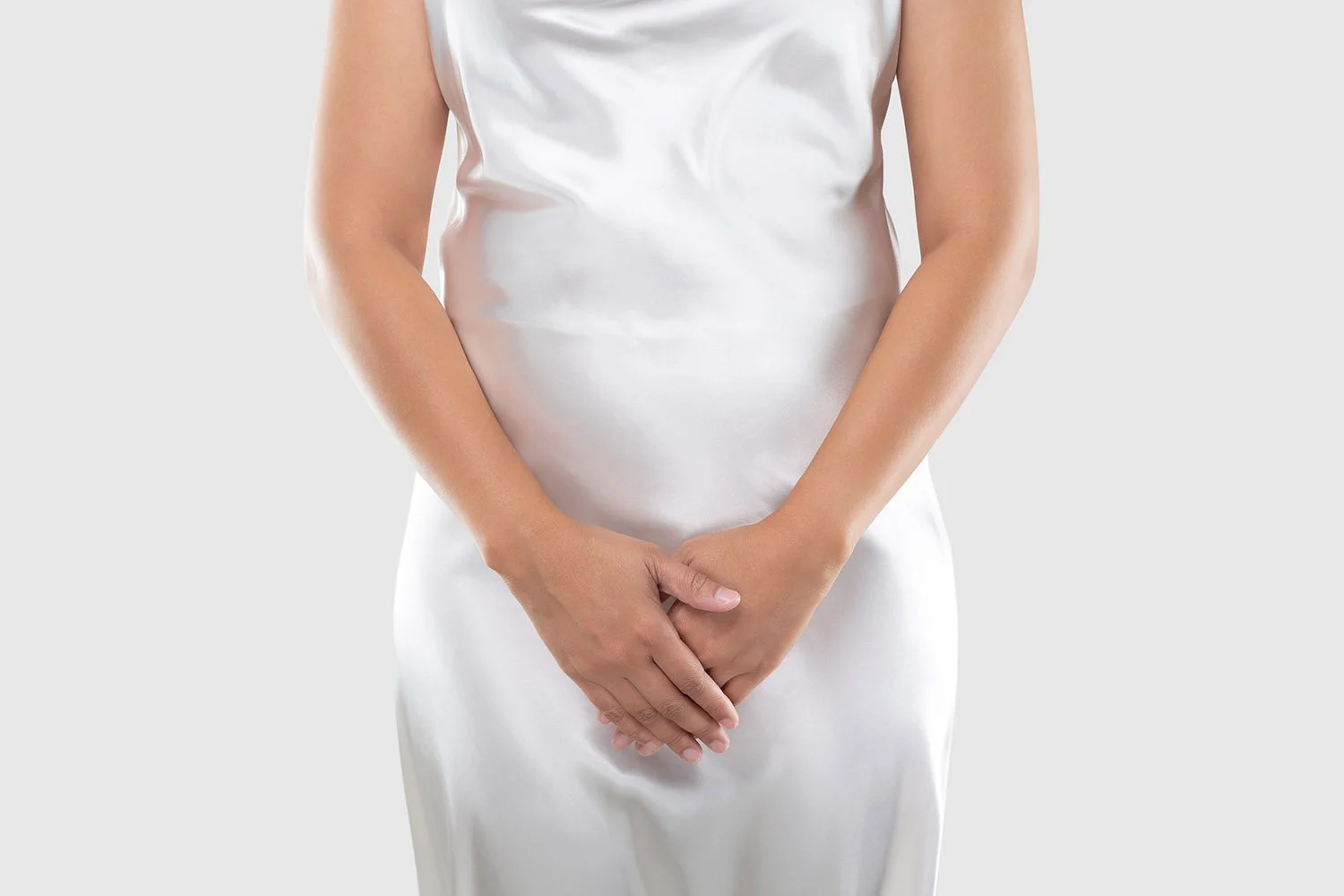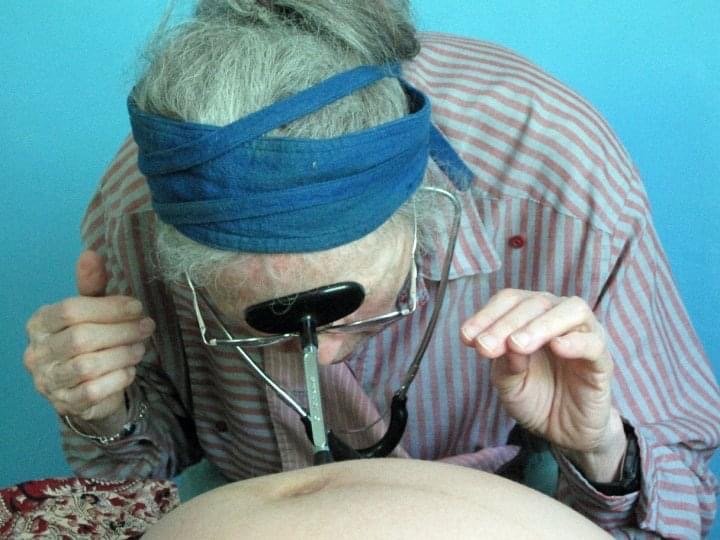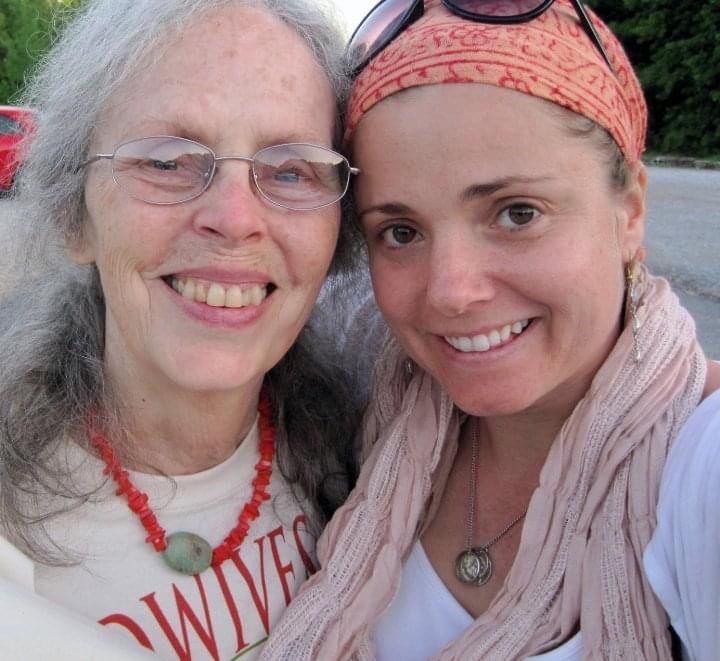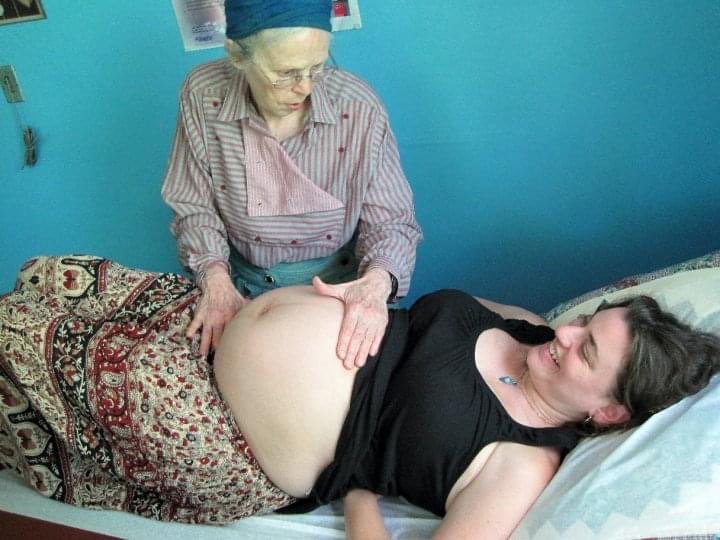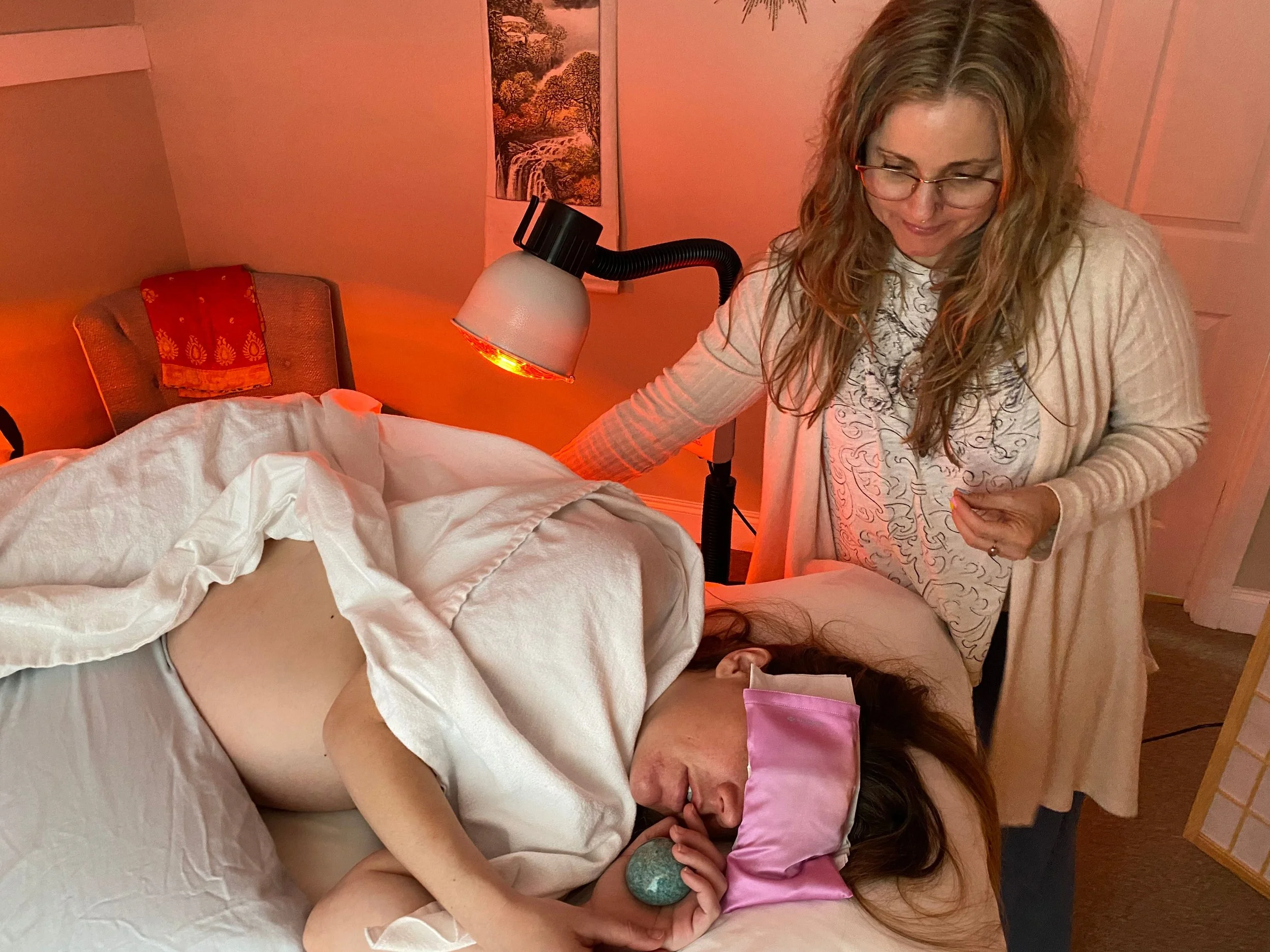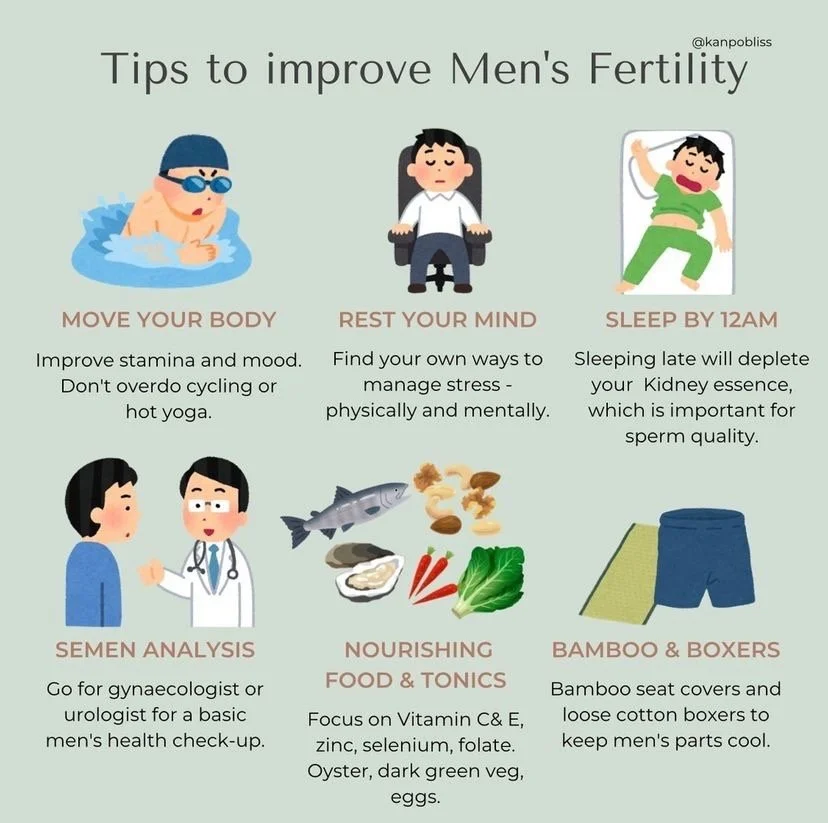Women's Cycle Within Yin and Yang (Pt. 4)
Learn about the ovulatory phase of the menstrual cycle in this wellness post. We answer the questions ~ What is the ovulatory phase? What is the best movement to do? What foods are best during this time?
~ The Ovulatory Phase ~
In Chinese medicine, the menstrual cycle is broken into two halves and four phases. The two halves are the Yin phase and the Yang phase. The four phases are menstrual, post-menstrual (follicular), ovulation, and pre-menstrual or implantation (luteal).
This blog post is the fourth in our series:
“Women’s Cycle Within Yin and Yang”
If you missed the three previous posts of this series you can catch up here:
General Overview
Menstrual
Follicular
The Ovulatory Phase of the Menstrual Cycle
After the Follicular Phase, our bodies enter the Ovulation Phase of the menstrual cycle. Ovulation is the midway point, typically occurring around 11 to 16 days before the start of your next bleed. Ovulation is the dividing point between the follicular and luteal phases of your overall cycle. During ovulation, ovaries release an egg in preparation for pregnancy. However, even if you are not trying to conceive, it can be very empowering and insightful to track your ovulation. It keeps you in tune with where your body is and what actions, foods, and wellness needs will leave you feeling like your best self. At this point in your cycle, the hormones estrogen and testosterone rise, which usually will result in feeling more energized. After this rise, these hormone levels drop sharply as we enter into the Luteal Phase.
Within Yin and Yang, ovulation is the “teetering point”. We are at the very peak of Yin energy during this phase and Yang energy is beginning to rise up. Just before ovulation occurs, the body is in a Yin state and as ovulation ends, the body is in a Yang state.
As women, it is important to know that as we go through our cycle, our needs, emotions, energy levels, appetite, sleep, and sex drive change as we transition from phase to phase. By becoming consciously aware of where we are, we can show up for ourselves in the best way possible and nourish our body's needs.
How Can Acupuncture Support Ovulation
As an acupuncturist that primarily works with fertility patients, I am passionate about supporting healthy ovulation. There is an overall focus on helping the egg to mature, supporting the body and mind to reduce stress, working towards regulating irregular cycles, and encouraging the body to have a healthy ovulation.
Certain herbal tonics I may prescribe have the effect of enhancing the surge of LH (luteinizing hormone), which stimulates the body to release the egg. While specific acupuncture points and other herbs have a moving effect on the body, which encourages the egg through the fallopian tube towards the uterus.
Studies have shown that acupuncture enhances ovarian blood flow, which is essential for the health of eggs. Blood flow can additionally be improved by making sure that you are staying hydrated and exercising regularly.
Regular acupuncture sessions at Krystal Kinnunen Acupuncture can support a healthy conception, as well as help with many medical conditions that may be contributing to difficulty conceiving, including: increasing fertility naturally, ovarian cysts, premature ovarian failure, luteal phase defect, damaged or blocked fallopian tubes, thyroid issues, pH balance, restricted blood flow to the uterus and ovaries, poor egg quality, sperm quality and mobility, irregular cycle and advanced maternal age (AMA). For more information on Fertility Acupuncture, please click here.
How to support your body during the ovulatory phase
This time in your cycle is the ample time to focus on connection, time with friends, getting in touch with your adventurous side, or starting on that fun project you have been wanting to tackle. Tap into your creative self and take advantage of that extra boost of energy to bring your visions to life. Communicate your needs and feelings openly, don’t bottle up what may arise during this phase.
This is the time to embrace your confidence and have fun!
Best Movement for this Time:
Take advantage of this peak in energy levels by doing movement practices such as HIIT, Cycling, Kickboxing, Strength Training, Pilates, Group Fitness Classes (embrace the social life!)
Best Foods for Nourishing this Phase:
Veggies ~ With estrogen at its peak, supporting liver detoxification is important. Leafy greens and cruciferous veggies will be your best friend! Some of these veggies would be brussels sprouts, kale, cabbage, turnips, cauliflower, bok choy and broccoli. Tomatoes, bell peppers, eggplant and asparagus (rich in Vit. C!) are other excellent options!
Fruits ~ Incorporating fruits such as berries, coconut, cantaloupe, fig, apricot, and guava is a great way to get more antioxidants and added hydration into your diet.
Grains ~ It is best to stick to lighter grains like quinoa and amaranth during this phase.
Protein ~ The omega-3 fatty acids in fish are excellent during the ovulatory phase ~ salmon and sardines. In addition, shrimp, eggs, and red lentils are all great options!
Nuts/Seeds ~ Have you heard of seed cycling before? During the follicular half of our cycle (menstruation+ovulation time), eating pumpkin seeds and flaxseeds can help to reduce PMS symptoms and support ovulation. Pumpkin seeds have high levels of zinc and magnesium (reducing PMS symptoms) and flaxseeds are high in fiber and lignans which can bind to excess estrogen. Beyond these helpful seeds, I recommend eating almonds, walnuts, pecans, and pistachios.
Extras ~ Dark Chocolate (antioxidant+improves blood flow), Turmeric (anti-inflammatory+liver detox), and Dandelion Root (liver detox)
Acupuncture For Headache and Migraines
Explore the ancient practice of acupuncture for relief from headaches and migraines. Uncover its types, benefits, and how it triggers the body's healing response. Consult Dr. Krystal Kinnunen, a certified expert with 12 years of experience, at Krystal Kinnunen Acupuncture for a holistic approach to well-being.
If you're among the millions of Americans grappling with tension headaches or migraines, you're likely all too aware that over-the-counter medication and some downtime often don't fully alleviate the discomfort. This is leading many to explore alternative treatments, such as acupuncture, as a way to better manage their headache pain.
Acupuncture, What Is It?
Originating in ancient China, acupuncture is based on the theory that the human body has thousands of pressure points, interconnected by pathways, that contribute to overall health and well-being. By inserting thin needles into these specific points, acupuncture is thought to trigger the release of hormones that initiate a healing response within the body.
Four Main Types of Acupuncture:
Full-Body Acupuncture: The traditional form of the practice, this method targets points across various parts of the body to alleviate blockages and tap into the body's natural healing mechanisms.
Auricular Acupuncture: This specialized form focuses solely on the outer ear, treating a range of conditions including chronic pain and addiction.
Electroacupuncture: In this variation, mild electrical pulses are sent through the acupuncture needles to further stimulate the targeted points on the skin. This is often used to enhance the effectiveness of the treatment.
Community Acupuncture: This style is administered in a communal setting, where individuals remain fully clothed and sit in chairs. Needles are inserted into accessible areas of the body, making it a more affordable and social option for treatment.
Whether you're dealing with chronic headaches or seeking to enhance general well-being, acupuncture offers various approaches that could complement conventional treatments. Always consult with healthcare providers to determine what might be the best option for you.
How Acupuncture Helps Alleviate Headaches
The National Institutes of Health gives acupuncture a thumbs-up for effectively treating tension and migraine headaches, and that's not all—it's recognized for helping with a whole range of health issues.
So how does it work for headaches? Well, an acupuncturist strategically places thin needles at specific pressure points, focusing on areas around your head and neck. This process releases endorphins and other feel-good hormones while kickstarting your circulatory system. The result? It takes the edge off your headache pain.
If you're thinking about giving it a shot, plan on around six to eight weekly sessions. Oh, and don't be surprised if your acupuncturist throws in some dietary advice to further help with your headaches.
What To Expect At Your Acupuncture Appointment
Feeling a bit on edge about your first acupuncture session? You're not alone. Knowing what to anticipate can help you ease into it and get the most bang for your buck.
Typically, your appointment starts with a conversation about your health history and what you aim to achieve with the acupuncture. This helps tailor the session to your specific needs.
Next comes the acupuncture itself. Sometimes, a mild electric current is also applied to the needles to enhance the treatment. Don't sweat it though; a lot of people hardly feel the needles at all. Others might experience a light sense of pressure, warmth, or a minor pinch, but these sensations usually go away pretty fast. Most people report feeling relaxed or even energized after the session.
If you've got the jitters, definitely let your practitioner know. They've got tips to help you mellow out and feel more at ease. After the session, your acupuncturist will usually offer some parting advice or recommendations to help maintain the benefits and manage your pain.
Krystal Kinnunen Acupuncture: Your Local Expert In Acupuncture
When you suffer with chronic headaches or migraines and nothing else has worked or you just prefer a more Eastern medicine like approach to your health, acupuncture can be the answer.
Dr. Krystal Kinnunen, DAOM, L. AC, is certified through the National Certification Commission For Acupuncture and Oriental Medicine (NCCAOM) in Acupuncture, Chinese Herbal Medicine, and Traditional Oriental Medicine. She has been practicing acupuncture for 12 years, and in addition to infertility, she treats various other issues, including maternity and postpartum care, chronic pain, mental health, digestive health, and women’s health.
Call (or text) 828-739-0345 to contact us today to schedule your acupuncture appointment and get started on your path to wellness and fertility. You can also book an appointment directly or use the contact form to reach us.
Acupuncture for Anxiety: A Comprehensive Overview
Discover how acupuncture can complement traditional anxiety treatments. Learn about anxiety's physiological roots and how a holistic approach addresses mental and physical wellness.
The Multifaceted Nature of Anxiety
Anxiety manifests in diverse forms, ranging from mild apprehensions to intense fears, phobias, and panic attacks. It can affect various facets of life, including relationships, professional commitments, and social activities. Additionally, anxiety may exacerbate physical symptoms like muscular tension and insomnia, detracting from overall quality of life.
Various treatments can effectively manage anxiety, including Cognitive Behavioral Therapy (CBT), pharmacotherapy, and lifestyle changes such as regular exercise and a balanced diet. However, complementary therapies like yoga, meditation, and acupuncture are also gaining traction as beneficial interventions for anxiety.
Before delving into how acupuncture can be a valuable adjunct treatment for anxiety, let's explore the physiological aspects contributing to anxiety symptoms.
Physiological Contributions to Anxiety
The Autonomic Nervous System & HPA Axis
The human stress response is principally regulated by the Autonomic Nervous System (ANS), which balances the sympathetic "fight or flight" response with the parasympathetic "rest and digest" mechanisms. The Hypothalamic-Pituitary-Adrenal (HPA) axis also controls the secretion of stress hormones like adrenaline and cortisol.
The pace and demands of modern life often overstimulate our stress response, owing to factors like work pressure, family responsibilities, and financial strain. Chronic exposure to such stressors can lead to a cycle of heightened sympathetic arousal, thereby fostering anxiety and perpetuating the cycle of stress and anxiety.
Inflammation and Its Role
Modern lifestyles often exacerbate inflammation through poor nutrition, sedentary behavior, chronic stress, sleep deprivation, and environmental toxins. Inflammation may contribute to anxiety in several ways:
Influencing neurotransmitter activity related to mood regulation
Activating the HPA axis, resulting in overproduction of stress hormones
Impacting the gut-brain connection through the gut microbiome
Gut Microbiome and Its Connection to Anxiety
Research increasingly focuses on the gut microbiome and its far-reaching impact on overall health, including mental well-being. Factors such as poor diet, sleep deprivation, stress, and toxins can disrupt the balance of gut flora. These disruptions are believed to affect the brain's function and mood regulation through the vagus nerve, neurotransmitter production, and immune system interactions.
Acupuncture's Potential for Anxiety Regulation
Emerging research suggests that acupuncture positively influences the physiological areas outlined above. However, at Krystal Kinnunen Acupuncture, the emphasis is on treating the individual as a whole rather than just addressing specific symptoms or body systems. Chinese medicine acupuncture offers a holistic approach customized to your unique health needs.
Through this comprehensive approach, we aim to improve your anxiety symptoms and other essential health markers such as sleep quality, digestion, pain management, and overall stress levels.
Acupuncture - A Wholistic Treatment Option
Anxiety is a complex condition influenced by a myriad of physiological factors. Acupuncture, as practiced at Krystal Kinnunen Acupuncture, offers a holistic treatment modality that could complement conventional treatments. By considering the interrelated nature of physical and mental health, we strive to offer tailored treatment plans that improve multiple aspects of your well-being.
Read Next: Acupuncture: A Potential Solution for Alleviating Dysmenorrhea
We are here to provide effective and patient-centered care. Click here to book your appointment.
Acupuncture as a Supplemental Treatment for Cancer-Related Symptoms
Evidence indicates that acupuncture is a safe and effective adjunctive treatment for managing certain symptoms associated with cancer and its treatments. Asheville Integrative Acupuncture offers services aligned with complementary and alternative medicine options recognized by healthcare organizations like the NHS in the United Kingdom.
Evidence indicates that acupuncture is a safe and effective adjunctive treatment for managing certain symptoms associated with cancer and its treatments. Krystal Kinnunen Acupuncture offers services aligned with complementary and alternative medicine options recognized by healthcare organizations like the NHS in the United Kingdom.
Acupuncture's Benefits According to NIH
The National Institutes of Health (NIH) outlines multiple symptoms and side effects that acupuncture has the potential to alleviate, including but not limited to:
Chemotherapy-Induced Nausea and Vomiting: Effective for individuals undergoing chemotherapy, surgery, or radiation therapy.
Pain Management: Useful for cancer-related pain, postoperative pain, muscle and joint pain from aromatase inhibitors, muscle and joint pain in cancer survivors, and chemotherapy-induced peripheral neuropathy.
Hormonal Side Effects: May alleviate hot flushes caused by hormone treatments.
Oral Health: Addresses symptoms of dry mouth (xerostomia).
Sleep and Fatigue: This can improve sleep quality and manage fatigue.
Immune System Support: Potential to bolster the immune system.
Digestive Issues: Effective for conditions like constipation and poor appetite.
Mental Well-being: Helpful for managing anxiety and stress.
Additional Cancer-Related Symptoms: This can benefit other signs and side effects of cancer and its cures.
Case Studies: Chemotherapy-Induced Nerve Changes
According to experience garnered by Krystal Kinnunen Acupuncture, the practice has observed significant improvement in patients experiencing nerve alterations due to chemotherapy. Common symptoms such as numbness, tingling, and sensation changes in extremities like hands and feet have been successfully managed through acupuncture.
Read Next: Understanding Uterine Fibroids: Incidence, Causes, and Symptoms
Empirical Support
A study involving 302 breast cancer patients showed that acupuncture was beneficial in managing various symptoms over six weeks. The symptoms ranged from mental fatigue and physical pain to anxiety and depression (Cancer Research UK, 2022).
By considering acupuncture as a supplemental treatment, patients may find an additional avenue for enhancing their well-being and managing the side effects of cancer and its treatments.
We are here to provide effective and patient-centered care. Click here to book your appointment.
Managing Nausea and Vomiting During Pregnancy with Acupuncture
This blog discusses the causes of morning sickness, common triggers, the potential benefits of acupuncture, and various dietary and lifestyle tips to prevent morning sickness naturally.
Morning sickness is a familiar term often associated with early pregnancy, describing a range of symptoms, including nausea, vomiting, food aversions, and changes in appetite. Predominantly appearing during the first trimester, some women may experience morning sickness throughout their pregnancy.
A smaller proportion of pregnant women may suffer from hyperemesis gravidarum, an extreme form of morning sickness characterized by consistent nausea and vomiting, often leading to weight loss, dizziness, and dehydration. Any morning sickness symptoms should be discussed with your primary care physician or OB/GYN doctor to rule out other serious conditions.
This guide discusses the causes of morning sickness, common triggers, the potential benefits of acupuncture, and various dietary and lifestyle tips to prevent morning sickness naturally.
Understanding Morning Sickness: Causes and Triggers
Morning sickness, which can occur at any time of the day or night, primarily results from a rapid increase in hormones during the first trimester. The hormone hCG (human chorionic gonadotropin), produced by the placenta following embryo implantation in the uterus, helps maintain the pregnancy by stimulating progesterone production. A surge in hCG, along with estrogen and thyroid hormones, can trigger nausea and vomiting.
Blood sugar imbalances can also contribute to morning sickness. Hormonal changes can disrupt the body's regulation and metabolism of glucose, often reducing available glucose and leading to hypoglycemia (low blood sugar). Extended periods between meals or snacks can cause a drop in blood sugar levels, triggering nausea.
Other potential triggers for morning sickness include stress, multiple pregnancies (e.g., twins or triplets), over-exertion, fatigue, certain foods and drinks, odors, and heat.
The Role of Acupuncture in Managing Morning Sickness
In Traditional Chinese Medicine, morning sickness is viewed as an energetic imbalance between the Liver and the Stomach/Spleen organ system, leading to gastrointestinal disturbances.
Acupuncture has shown promising results in treating and preventing morning sickness. In one study, pregnant women receiving weekly acupuncture treatments reported fewer instances of nausea and dry retching than those not receiving treatment.
Acupuncture can alleviate nausea and vomiting by:
Increasing endorphins and ACTH (adrenocorticotropic hormone) secretion from the pituitary gland, inhibiting nausea and vomiting triggers in the brain.
Acting on the upper gastrointestinal tract reduces stomach acid secretion, as increased stomach acid can lead to nausea, bloating, and heartburn.
Stimulating the production of hormones that enhance feelings of well-being and promoting relaxation.
Acupuncture's effectiveness can vary based on individual factors such as severity and frequency of morning sickness, personal constitution, medical history, and body response to treatment. Your acupuncturist can provide specific advice during your initial consultation.
Dietary and Lifestyle Approaches for Morning Sickness
Dietary and lifestyle factors significantly impact pregnancy experiences. Here are some tips to potentially reduce nausea and vomiting:
Eat small meals or snacks frequently to maintain blood sugar levels. Having handy snacks such as nuts, fruits, or homemade granola bars can help avoid hunger-induced nausea.
Avoid coffee and other stimulants like tea or cola, as they can exacerbate symptoms.
Stay hydrated with filtered water and herbal teas, especially after bouts of vomiting. You may need to increase your intake of electrolytes to maintain body water balance.
Ginger, a traditional remedy for morning sickness, can be taken as a tea, liquid tincture, capsule, or tablet. Consult with a licensed acupuncturist or board-certified herbalist for appropriate dosing.
Natural Prevention of Morning Sickness
Morning sickness can significantly impact women's well-being during pregnancy. Hormonal changes, stress and low blood sugar levels are common triggers. Small, frequent meals, avoidance of trigger foods and caffeine, regular acupuncture sessions, and ginger use can help maintain balance, promote relaxation, and reduce symptoms.
Always consult with a healthcare professional before starting any new treatment strategies.
We are here to provide effective and patient-centered care. Click here to book your appointment.
Acupuncture: A Potential Solution for Alleviating Dysmenorrhea
Many women endure the agony of painful periods. Acupuncture can offer an effective solution to manage painful periods and improve overall menstrual health.
While acupuncture is traditionally renowned for its effectiveness in treating common ailments like lower back pain and headaches, its potential benefits for menstrual health often go unnoticed. Many women endure the agony of painful periods, also known as Dysmenorrhea, during various stages of their life. This discomfort frequently compels them to sacrifice important routine aspects, such as work, school, or other social engagements.
The impact of persistently painful menstrual cycles can manifest physically and emotionally over time. In severe cases, conditions like endometriosis, potentially induced by prolonged periods of pain, could lead to complications like infertility. Whether it's affecting a woman's regular activities like working, studying, raising children, or even her fertility, acupuncture can offer an effective solution to manage painful periods and improve overall menstrual health.
Understanding Dysmenorrhea
Dysmenorrhea, which is distinctly different from premenstrual syndrome (PMS), involves two types: Primary and Secondary Dysmenorrhea. Primary Dysmenorrhea refers to painful cramps not instigated by an external condition, whereas Secondary Dysmenorrhea is a consequence of an underlying condition, such as Endometriosis or Pelvic Inflammatory Disease (PID).
Both types result in debilitating cramping that typically commences within 8-72 hours of menstruation, peaking with the surge in menstrual flow during the initial days of the menstrual cycle. Besides intense cramps, women suffering from primary Dysmenorrhea may also experience symptoms like back and thigh pain, headaches, diarrhea, nausea, and vomiting.
Root Causes of Menstrual Cramping
Dysmenorrhea, particularly prevalent among young women in their teens and early twenties, is often underestimated and ignored. However, it's crucial to understand that these cramps can be symptomatic of underlying physical issues.
Increased hormone prostaglandins F2 alpha (PGF2 alpha) levels in the menstrual blood are one primary cause of cramping. Released into the bloodstream as the endometrial lining breaks down, this hormone causes the uterus to spasm, resulting in cramping pain. Stress-prone individuals or those following a diet high in carbs and low in fats are likely to have elevated levels of PGF2, leading to increased cramping. Therefore, lifestyle modifications like improved nutrition, stress management, and acupuncture help balance these hormones, relieving cramping.
Role of Acupuncture in Alleviating Dysmenorrhea
Acupuncture, a key element of traditional Chinese Medicine, can effectively treat painful periods by addressing symptoms and underlying causes. Studies have illustrated how acupuncture can influence uterine activity, locally calming cramps and even having a systemic effect via the mid-brain.
Local acupuncture treatment helps ease tissue tension in the uterus, increases blood flow to the area, releases pain relief hormones, and directly influences female hormones like estrogen and progesterone. A combination of abdominal and distal points on the legs is often used to devise a customized treatment plan for cramping relief.
One example of this is the acupoint SP6 (Sanyinjiao), which despite being distal, effectively treats Dysmenorrhea. This acupoint is segmental to the uterus, and its activation at the sacral spinal nerve 2 (S2) level could lead to reflex sympathetic inhibition of the uterus, resulting in increased uterine blood flow. By working through the interstitial space (the space between the skin and the muscles), acupuncture influences the nervous system to either activate or suppress it, thereby affecting the entire zone controlled by the nerve.
Concluding Thoughts
Painful periods can greatly disrupt a woman's life, potentially impacting her sleep, energy levels, emotional well-being, and relationships. Recognizing and addressing the pain as a signal of an underlying imbalance is essential. Chinese Medicine and acupuncture provide a safe, non-drug, and effective alternative to alleviate painful periods, enhancing a woman's quality of life.
We are here to provide effective and patient-centered care. Click here to book your appointment.
Understanding Uterine Fibroids: Incidence, Causes, and Symptoms
Uterine fibroids are invasive growths that may form during reproductive age, from menarche to menopause, with heightened prevalence observed among women aged 30 to 40.
Uterine fibroids are invasive growths that may form during reproductive age, from menarche to menopause, with heightened prevalence observed among women aged 30 to 40. Interestingly, 10% of women experience uterine fibroids without evident symptoms such as pain and heavy bleeding. Moreover, an imbalance in our monthly hormonal transitions may lead to the development of fibroids, a condition seen in Polycystic Ovarian Syndrome (PCOS).
The causes of uterine fibroids are not fully understood, but various factors have been implicated in their growth. Genetics may play a role, as certain genes can influence uterine fibroid growth. However, these genes need epigenetic triggers, i.e., environmental factors, to activate. Hormonal imbalance, including levels of progesterone, estrogen, and growth factors, also contributes to fibroid growth. For instance, uterine fibroids possess more receptors for estrogen and progesterone than healthy muscle, making them susceptible to hormonal influences.
Risk Factors for Uterine Fibroids
Certain factors seem to predispose women to the development of uterine fibroids. These include age (particularly between 30 and 40), ethnicity (with African-American women at higher risk), and the onset of menstruation before age 10. Lifestyle choices, particularly those leading to an increase in adipose tissue, are also contributory, as they facilitate the conversion of androgens to estrogen.
Vitamin D deficiency can also increase the chances of fibroid growth. Interestingly, smoking, due to its estrogen-blocking effect, has been observed to offer some protection against fibroids. However, this is not a recommended preventive measure due to the significant health hazards of smoking.
Detecting Uterine Fibroids: Symptoms and Diagnosis
Typical symptoms of uterine fibroids include heavy menstrual bleeding lasting longer than a week, constipation, an enlarged lower stomach or bloating, and depression. Pelvic pressure and pain, frequent urination, difficulty emptying the bladder, back pain, and leg pain are also possible symptoms.
Uterine fibroids can lead to serious complications, including anemia due to heavy and prolonged bleeding, risk of miscarriage, placenta abruption, and premature labor. They are typically diagnosed through a pelvic exam, ultrasound, blood tests, and possibly an MRI for more precise size and location determination.
Conventional Treatments for Uterine Fibroids
If fibroids are asymptomatic, the common advice is a "watch and wait" approach. Other treatment options include drugs, hormonal therapies, and surgeries. However, these treatments may not be suitable for women trying to conceive, emphasizing the importance of discussing these options with a gynecologist.
Acupuncture, Herbal Medicine, and Lifestyle Changes as Alternatives
Acupuncture and Herbal Medicine can help reduce uterine fibroids, improve fertility options, and manage any regrowths. These Traditional Chinese Medicine (TCM) treatments focus on the individual's specific type of fibroid and pattern of symptoms.
TCM also emphasizes nutrition as a key part of fibroid management. It is important to avoid trans fats and reduce red meat consumption while increasing the intake of whole fruits, vegetables, and grains. Caffeine, alcohol, and processed foods should be minimized.
Exercise and meditation also play a crucial role in managing fibroids. Strength training can build lean muscle and decrease fat, which helps reduce excess estrogen levels. Enjoyable cardio activities can help control insulin and blood sugar levels.
Acupuncture and herbal medicine are not quick fixes but lifestyle adjustments that take time to manifest changes. It takes at least four months to observe changes in fibroid growth. While time-consuming, these treatments are safe, drug-free, and minimally invasive, making them a viable option for those trying to conceive or those with recurrent fibroids post-surgery or resistance to hormonal therapies.
See also: Everything You Need and Want to Know About General Acupuncture
A Comprehensive Approach to Uterine Fibroids
Understanding and managing uterine fibroids requires a comprehensive, individualized approach, incorporating genetic factors, lifestyle choices, hormonal influences, and symptom patterns. While conventional treatments, including drugs and surgeries, offer effective intervention strategies, they may not be suitable for all, particularly those wishing to conceive.
Emerging as a viable alternative, Traditional Chinese Medicine, encompassing Acupuncture and Herbal Medicine, offers a holistic, drug-free, and less invasive treatment strategy. Despite requiring lifestyle adjustments and a considerable time frame to yield noticeable results, these modalities target not only the symptoms, but the cause of fibroid growth, thereby aiming to reduce recurrences.
Moreover, these approaches underscore the importance of dietary and lifestyle modifications in managing fibroids. By focusing on nutrition, exercise, and stress management, individuals can effectively influence their hormonal balance and overall health, thereby minimizing the factors contributing to fibroid growth.
While common and potentially disruptive, uterine fibroids are manageable through modern medical treatments and time-honored traditional practices, offering hope to those affected by this condition.
We are here to provide effective and patient-centered care. Click here to book your appointment.
Call The Acupuncturist
A look into my time with Ina May Gaskin & and the importance of acupuncture for pregnancy, birth prep, and the postpartum period.
I LOVE Midwives!
I’m sure if you are like me and love midwives, you will immediately know the name Ina May Gaskin, who has been given the title “mother of authentic midwifery”. After I had my second baby and was bedridden, I binge-watched the show “Call the Midwife”. I highly recommend this show if you have not watched it! In many ways, an acupuncturist can be called upon for your pregnancy, birth, and postpartum needs just as a midwife can be. We are here to help you in creating a loving, nourishing, and healthy pregnancy. I would love to support you in one of the greatest transitions someone can experience, so… Call the Acupuncturist! 😊
My Time at The Farm
In 2010, after my mom passed away, I felt called to be a midwife and to support women on their journey through pregnancy and birth. As I began researching, I saw that The Farm had a training program to become a midwife’s assistant. At the time, New Dawn Midwifery was open in Asheville and I was hoping to work for them.
My time at The Farm was an essential part of healing and nurturing my spirit, while I was still deep in the throes of grief. This experience nurtured me on a soul level. The pure consciousness of The Farm and deep intention that went into every moment was exactly what I needed. The integration of healthy food and the continuous love of women supporting women. I loved being in the space of knowledge, being guided by Ina May and Pamela Hunt. This time awakened my passion for supporting women more thoroughly and intensely. From here I realized that a well-loved and supported parent creates a better society and brings more harmony into our world.
Although I chose to become an acupuncturist, it was in this training that I realized the multitude of ways women can be supported in pregnancy, birth and beyond. Since my time at The Farm, I have helped many women and birthing people in experiencing a more nourished, healthy, and supported pregnancy, birth, and postpartum period. The knowledge I received from The Farm has deeply affected the way that I care for women and mothers. I am eternally grateful for that sweet and sacred time.
Acupuncture for Pregnancy in Vail Valley, CO
I offer pregnancy acupuncture for every trimester as well as postpartum. Regular acupuncture sessions during pregnancy can relieve a multitude of ailments, as well as reduce your risk of miscarriage, assist with easier delivery, and facilitate your transition into motherhood once your child is born. I feel extremely passionate about sharing this potent medicine with women, as I know first-hand how amazing it can be!
First Trimester:
Nausea
Heartburn
Constipation
Headache/migraine
Exhaustion
Mood swings
Hyperemesis gravidarum
Happy Baby Point* to clear fetal toxins
Second Trimester:
Edema (swelling in feet, ankles, hands, etc.)
Body aches and pains
Hypertension
Carpal tunnel syndrome
Round ligament pain
Leg cramps
Happy Baby Point* to clear fetal toxins
Third Trimester:
Hemorrhoids
Trouble sleeping
Breech babies
Preparing baby for labor
Labor induction
Postnatal Care:
Healing after delivery
Postnatal depression / anxiety
*The Happy Baby Point (also known as Beautiful Baby) is a single acupuncture point that, when activated, helps minimize the transmission of toxins from mother to baby. I recommend this treatment at the end of the first and second trimesters to increase your baby’s overall health and resistance to illness.
Acupuncture for Labor Preparation
This article delves into how acupuncture aids labor preparation, detailing the benefits, effective points, our approach to labor preparation, and our clinical observations.
Acupuncture serves as a valuable technique for labor preparation and natural induction. We frequently witness expectant mothers seeking natural methods to prepare for labor, aiming to reduce the risks associated with scheduled inductions or cesarean sections.
This article delves into how acupuncture aids labor preparation, detailing the benefits, effective points, our approach to labor preparation, and our clinical observations.
Challenging Society's Perspective on Birth
Our society often paints a distressing image of childbirth, characterized by pain, fear, and potential failure. Movies, anecdotal stories from relatives, and fear-inducing tactics in mainstream medicine contribute to this daunting portrayal. However, acupuncture for labor induction extends beyond mere uterine contractions. Labor is a complex process governed by hormones and dependent on a sense of safety, support, knowledge, instinct, and trust. Regardless of the birth setting, feeling acknowledged, supported, and informed during every decision-making step leading up to and during birth is crucial.
Acupuncture and Labor Preparation: Starting at 37 Weeks
Initiating labor preparation at 37 weeks of pregnancy allows safe preparation for labor at physical, emotional, and mental levels. Employing acupuncture for labor preparation offers multiple benefits. These include cervical ripening, shortening labor duration, decreasing anxiety and fear, releasing past womb trauma stored in the pelvis, relaxing tension in the hips and lower back, and enhancing uterine contractions by influencing the umbilical artery waveforms.
Typically, acupuncture is administered weekly from the 37th to the 40th week and then twice per week until labor begins. We have found that the treatment often leads to increased uterine contractions, regular surges, enhanced relaxation, smoother birth, and reduced labor duration. On average, labor may commence within 1.5 days following an acupuncture treatment during the 39th to 41st week of gestation.
Proven Efficacy of Acupuncture in Labor Induction
Acupuncture, with or without electrical stimulation, has proven to be an effective, painless, and uncomplicated method to induce labor. As supported by scientific studies, acupuncture stimulation, potentially of neural origin, modifies the uterine contraction pattern, differing from oxytocin-induced and spontaneous labor. However, further investigation is needed to understand this unique pattern and the mechanism of acupuncture stimulation.
Key Acupuncture Points for Labor Preparation
Popular acupuncture points utilized for labor preparation include Spleen 6, 8, Large Intestine 4, Urinary Bladder 67, and Gall Bladder 21. Customized to the mother's needs, these points primarily assist in downward movement, facilitating natural uterine contractions and cervical opening. Additional points aim to alleviate lower back pain during labor, relax joints, open the pelvis, and soothe the nervous system, thus enabling the natural biological processes of labor to commence and proceed smoothly.
Treatment Flow for Acupuncture Labor Preparation
The typical acupuncture labor preparation treatment process includes a medical intake and questionnaire, assessment of pelvic tightness, alignment, and baby's position (with consent), tongue and pulse evaluation, acupuncture point selection, the potential use of electroacupuncture on SP 6 and LI4, and Tui Na (Asian Body Work) to open the channels, widen the hips, and support labor. Each expectant mother receives a personalized and detailed health plan to ensure the best possible labor and birth outcome.
Acupuncture is a Holistic, Non-Invasive Approach
Acupuncture presents a holistic, non-invasive approach to labor preparation, providing both physical and emotional benefits. Not only does it help prepare the body physically for childbirth, but it also supports emotional readiness by decreasing anxiety and fear.
By leveraging acupuncture, expectant mothers can benefit from potentially shorter and smoother labor experiences, transforming the conventional apprehension associated with childbirth.
As each pregnancy is unique, we ensure a customized approach tailored to every mother's needs, promising the best possible labor and birth outcomes. Further studies will only strengthen our understanding of this ancient practice, affirming its integral role in modern maternity care.
Read Next: Increase the Chance of Getting Pregnant with Fertility Acupuncture
We are here to provide effective and patient-centered care. Click here to book your appointment.
Everything You Need and Want to Know About General Acupuncture
Acupuncture is a treatment originating in ancient Chinese medicine dating back thousands of years. Learn more.
Acupuncture: What Is It?
Acupuncture is a treatment originating in ancient Chinese medicine dating back thousands of years. Within Chinese medicine, it is believed that there exists a type of energy or life force which is known as “qi” (pronounced “chee”). This life force flows through the meridians or energy pathways of the body. Each of these meridians corresponds to an organ or a group of organs, which control particular functions of the body. Getting the right flow of qi is believed to bring about good health and overall well-being.
Qi is responsible for maintaining the harmonious balance between yin and yang, two opposing yet complementary forces. In Chinese medicine, it's believed that everything in nature possesses both yin and yang qualities. When there's an imbalance in qi—whether it's excessive, deficient, or blocked—it can lead to illness. To rebalance the qi, an acupuncturist inserts needles at specific points along the meridians, energy pathways close to the skin's surface.
The History of Acupuncture
Acupuncture has quite a fascinating history! It dates all the way back to 200 BCE, making it one of the earliest recorded practices of its kind. The knowledge of acupuncture gradually made its way from China to the West, thanks to the trade routes traveled by Arab merchants.
In the United States, acupuncture caught people's attention in 1972 when President Nixon visited China. One of the folks who accompanied him was James Reston, a journalist from the New York Times. After having an emergency appendectomy, Reston received acupuncture in China and was amazed by how it relieved his post-operative pain. He was so impressed that he wrote about it upon returning to the United States.
It wasn't until 1997 that acupuncture gained even more recognition in the United States. The National Institutes of Health (NIH) officially acknowledged acupuncture as a legitimate option for healing, highlighting its safety and effectiveness for various health conditions. Despite its growing awareness, many traditional doctors are still not well-versed in the theory and practice of acupuncture.
If you delve into the wealth of clinical studies, you'll find a multitude of research conducted on the benefits of acupuncture. A significant number of these studies were carried out in China, where acupuncture has proven successful in treating a wide range of conditions. From tackling musculoskeletal problems like back pain and neck pain to addressing issues such as nausea, migraines, anxiety, insomnia, and pain management—acupuncture has shown promising results.
Acupuncture: How Does It Work?
The short answer is acupuncture works by activating a pathway between the endocrine system, which is responsible for releasing hormones, and the nervous system, which houses all of the nerves within our body.
The longer answer is that acupuncture stimulates the nerves within your body’s central nervous system which in turn causes the endocrine system to release hormones responsible for causing us to feel less pain, simultaneously improving our overall health.
The fact is, a study was conducted using brain image scans. The study concluded that acupuncture actually increases our overall pain threshold, which helps explain why it gives us long-term pain relief. Studies have also shown that acupuncture may increase body temperature and blood circulation, reduce cholesterol and triglyceride levels, affect the activity of white blood cells (important for our immune system), and help regulate blood sugar levels.
What Does Acupuncture Help Treat
Acupuncture is amazing in relieving pain and tackling pesky nausea or vomiting after surgery or chemotherapy. It's not just some random claim either—the World Health Organization (WHO) and the NIH give acupuncture a nod of approval as a valuable part of treatment plans for various illnesses. The list of conditions it can help with is quite extensive! We're talking about addiction (such as alcoholism), asthma, bronchitis, carpal tunnel syndrome, gastrointestinal problems like constipation, IBS and diarrhea, facial tics or other muscle spasms, fibromyalgia pain and symptoms, headaches or migraines, irregular menstrual cycles and menstrual period cramps, symptoms of polycystic ovarian syndrome, annoying back pain, menopausal symptoms, arthritic pain, sinusitis, stroke rehabilitation, tendinitis, tennis or golfers elbow, and even urinary issues such as incontinence.
Even more amazing is the fact that acupuncture plays well with others! You can safely combine it with natural supplements, otc medication, prescription drugs, and other Western medicine treatments. Just make sure your primary care physician keeps an eye on how acupuncture might be interacting with your ongoing therapies.
The American Academy of Medical Acupuncture has its own extensive list of conditions that can benefit from acupuncture. In addition to the ones mentioned earlier, they recommend acupuncture for everything from sports injuries and accidents such as sprains, strains, neck pain, whiplash, nerve pain caused by spinal disc compression, sciatica pain, carpal tunnel syndrome, and other repetitive use injuries, spinal cord injury pain, high blood pressure, allergies (both seasonal and food) asthma, allergic rhinitis, and even eczema. It also has been shown to help those who suffer from tinnitus (that annoying ringing in the ears), pharyngitis (a sore throat), gastroesophageal reflux (like heartburn or unsettling indigestion), stomach ulcers, chronic and painful recurring bladder and kidney infections, premenstrual syndrome (PMS), infertility, endometriosis, anorexia, memory problems, insomnia, multiple sclerosis, sensory disturbances, drug detox, anxiety, depression, and other mental disorders. It’s pretty amazing that this ancient Chinese medicine practice helps with so many things, isn’t it?
Acupuncture has got your back—literally and figuratively.
All About Dr. Kystal Kinnunen, DOAM, L. AC
As a Licensed Acupuncturist, Dr. Kinnunen has been utilizing the ancient practice of acupuncture for over 12 years to help many people with many different aches, pains, and other ailments. She was certified through the National Certification Commission for Acupuncture and Oriental Medicine (NCCAOM) in Acupuncture, Chinese Herbal Medicine, and Traditional Oriental Medicine, with a clinical focus on treating women’s health issues, chronic pain, and digestive health issues. She also specializes in the treatment of infertility, pregnancy symptoms, and postpartum care. Dozens of client testimonials praise her as they share their stories about how Dr. Kinnunen helped improve their lives!
Through Krystal Kinnunen Acupuncture, Dr. Krystal Kinnunen can help you, too, just like the countless others who have walked through her doors before you. Call (or text) 828-739-0345 or Click Here to schedule your appointment today and get started on your path to overall health and wellness.
Maintaining Women's Health With Acupuncture
When it comes to women's health issues, things can get pretty complicated and unique for each of us. Acupuncture might just be the answer we've been looking for. Seriously, it's a game-changer when it comes to tackling a bunch of women's health problems.
When it comes to women's health issues, things can get pretty complicated and unique for each of us. It's frustrating that traditional Western medicine always seems to push invasive procedures that mess with our hormones. And let's not forget about those prescription drugs with their crazy side effects. It's like we're stuck thinking those are the only options available.
But guess what? Acupuncture might just be the answer we've been looking for. Seriously, it's a game-changer when it comes to tackling a bunch of women's health problems. I mean, there are these six common issues it can help with, but trust me, there's a whole lot more it can do. So, when you're filling out that health intake form, make sure to spill all the deets to your acupuncturist. They'll have the answers to all your burning questions. Don't miss out on this amazing solution, ladies!
Tackling Menstrual Problems, Endometriosis, and Menopause
It's no secret that a lot of us ladies go through some serious complications during our menstrual cycles. I mean, every woman is unique, so that time of the month can be a real nightmare for some of us. I'm talking about crazy pain and discomfort that can knock us off our feet. But guess what? Acupuncture can swoop in and save the day, my friend. It's a total game-changer when it comes to tackling those pesky symptoms of endometriosis. Say goodbye to the headaches, irregular cycles, and those darn abdominal cramps that haunt us month after month.
And hey, let's not forget about those of us who are closing in on menopause. Yeah, that transitional period can be a rollercoaster ride. But fear not, because acupuncture has got our backs. It's like a superhero treatment for all those annoying symptoms that pop up during menopause. We're talking hot flashes, mood swings, insomnia, heart palpitations, and the list goes on. Trust me, this ancient practice has got the power to make your life a whole lot easier.
Read more: How Acupuncture Can Alleviating Menopausal Symptoms
Fertility Issues and Pregnancy
Let's talk about pregnancy, ladies. It's definitely a beautiful journey, but let's not sugarcoat it—it can be tough too. But guess what? Acupuncture has got our backs (literally!). You know that annoying low-back pain that often comes with pregnancy? Well, acupuncture treatments can work wonders for that. Say goodbye to those achy backaches!
And let's not forget about morning sickness and nausea. Ugh, they can really put a damper on the whole pregnancy experience. But fear not, because acupuncture swoops in to save the day once again. It's like a magical remedy that helps ease those dreadful symptoms. So long, morning sickness!
Now, if you're struggling with infertility, acupuncture might just be the missing piece to the puzzle. It's got some serious powers when it comes to addressing issues like irregular menstrual cycles and endometriosis. You see, acupuncture knows how to get that blood flowing to your reproductive organs, helping to regulate your menstrual cycle and improve your chances of conceiving.
So, ladies, don't underestimate the power of acupuncture. It's here to make your pregnancy journey a little smoother and your dreams of starting a family a little more attainable.
Read More: Increase the Chance of Getting Pregnant with Fertility Acupuncture
Ending Insufferable Insomnia
Let’s face it, insomnia is irritating. Research has actually shown that us ladies tend to suffer from insomnia more than the guys. Yeah, it's not exactly fair, but hey, we're strong, right? Now, here's where things get exciting—clinical studies have found that acupuncture can be a total game-changer when it comes to improving our sleep. That's right; it's like a secret weapon for getting back those restful nights we've been missing.
But here's the catch, my friend: regular acupuncture treatments are the key to success. So, make sure to have a good chat with your acupuncturist about your unique care plan. They'll work with you to tailor the treatments specifically for you because we all know that one-size-fits-all just doesn't cut it. Say goodbye to tossing and turning and hello to a peaceful, rejuvenating slumber. Trust me, your future well-rested self will thank you for it!
Minimizing Anxiety and Depression
If you find yourself suffering from anxiety and/or depression, you’re not alone. Like insomnia, both anxiety and depression seem to be more common in women than men. One in five women compared to one in eight men in the United States experience symptoms of Common Mental Disorders, according to AgendaAlliance.org
If you're searching for a drug-free solution, acupuncture has your back. Clinical research has shown that it can be just as effective as antidepressants. Yep, you heard that right. But here's the best part—it comes without all those nasty side effects that can sometimes accompany prescription meds. Say goodbye to that worry!
Regular acupuncture treatments can work wonders for your well-being. They can help lower your blood pressure, reduce those pesky instances of anxiety and panic attacks, and even bring your stress levels down a few notches. It's like a natural stress-buster that knows exactly what you need.
So, if you're tired of relying solely on medications and want a gentler approach, acupuncture is worth considering. It's all about finding the balance that works for you and your body. Talk to your acupuncturist, create a regular treatment plan, and get ready to embrace a healthier, more vibrant you—without any of those harsh side effects. You've got this!
Managing Chronic Pain
Millions of women suffer in silence with chronic pain, and it can be debilitating, to say the least. For many, the go-to solution is grabbing an over-the-counter pain med or that prescription bottle and hoping for the best. But what if you don’t want to get hooked on pain meds, or what if the pain meds just aren’t enough to take all the discomfort away? The answer might be in the power of those tiny Acupuncture needles. Acupuncture has got your back when it comes to tackling chronic pain.
Consistent acupuncture treatments can work wonders for various chronic pain conditions, whether it's arthritis, fibromyalgia, or an injury that's been nagging you for far too long. Say goodbye to those joint pains and the chronic inflammation that can come with arthritis. Acupuncture knows how to give you that relief you've been searching for.
Don't just rely on those painkillers. Contact Us at Krystal Kinnunen Acupuncture today to speak with a licensed Acupuncturist and see what options they have available for your chronic pain. They'll work with you to create a personalized care plan that targets your pain points and helps you find the relief you deserve. Don't let chronic pain hold you back any longer!
Read More: Acupuncture for Pain Management
Optimizing Your Skin’s Health
Hey, here's something really cool about acupuncture—you probably haven't even thought about it in this way before! Did you know that one of the amazing things acupuncture does is increase blood flow? And guess what? That can work wonders for your skin health, especially when it comes to your face.
Facial acupuncture is a game-changer when it comes to reducing puffiness and those pesky fine lines and wrinkles. Yeah, I know it sounds pretty unbelievable, but trust me, it's been backed up by clinical studies. So, if you're looking for a natural way to boost your skin's appearance, acupuncture is where it's at.
It's not just about anti-aging benefits—it goes beyond that. Facial acupuncture can truly be an asset to improving your overall facial skin health. And hey, when you feel good about your appearance, it can do wonders for your mood too. It's like a double win!
So, don't hesitate to give it a try. Talk to your acupuncturist about facial acupuncture and discover the wonders it can do for your skin. Get ready to say hello to a fresher, more youthful-looking you, inside and out.
Perfecting Your Overall Health and Wellness With Acupuncture
If you're on the lookout for an effective and drug-free way to tackle your health issues, acupuncture is the answer you've been waiting for. It's time to chat with your local licensed Acupuncturist and get the ball rolling on this amazing healing technique.
Start by having a thorough health history discussion with your licensed Acupuncturist. Lay it all out on the table, from your symptoms to your concerns. Together, you can create a personalized care plan that will specifically target your health issues and get you back on the path to wellness.
The beauty of acupuncture is that it works without the unwanted side effects that often come with powerful prescription medications. Say goodbye to all those worries and hello to a natural, safe, and effective approach to healing.
So, don't put it off any longer—make that appointment today. Your health deserves your attention and action. Take that first step towards a better, brighter future. You've got this!
About Dr. Krystal Kinnunen, DAOM, L.AC
My name is Dr. Krystal Kinnunen, and I have been practicing Chinese medicine and Acupuncture for over 12 years. I am certified through the National Certification Commission for Acupuncture and Oriental Medicine (NCCAOM) in Acupuncture, Chinese Herbal Medicine, and Traditional Oriental Medicine, with a clinical focus on treating women’s health issues, chronic pain, and digestive health issues. I also specialize in the treatment of infertility, pregnancy symptoms, and postpartum care.
In the last 12 years, I have helped countless women, and I can help you too! Call (or text) 828-739-0345 or Click Here to schedule your appointment today and start living your best life with the help of Acupuncture.
Acupuncture During Pregnancy: Why You May Want To Consider Trying It
Let me tell you about acupuncture during pregnancy! With all the tests, treatments, and preparations that come with being pregnant, it can be overwhelming. But have you considered acupuncture? Trust me; those little needles can work wonders!
Let me tell you about acupuncture during pregnancy! With all the tests, treatments, and preparations that come with being pregnant, it can feel like there's an overwhelming number of things "to do" or try. But have you considered acupuncture? Trust me; those little needles can work wonders! As a naturopathic doctor, I often get asked common questions about acupuncture in pregnancy, so let me address them for you.
First question: "I've heard acupuncture helps in pregnancy - is it true? Is it safe?"
Absolutely! Acupuncture is not only safe during pregnancy but also highly beneficial and effective. In the first trimester, it helps maintain the pregnancy, nourishes the body, and eases early symptoms like fatigue, nausea, and heartburn. As pregnancy progresses, acupuncture can greatly alleviate common discomforts such as aches, pains, constipation, and swelling.
Now, let's talk about the third trimester, a crucial time for acupuncture. This is when we focus on preparing the body for labor. I often recommend a series of pre-birth acupuncture points tailored to individual needs.
So, How Does it Work?
Pre-birth acupuncture is all about getting the body ready for labor. By tonifying and nourishing the body, the acupuncture points help relax and soften the uterine ligaments. They also increase blood flow to the pelvis, encouraging the baby to position itself properly in the birth canal. Additionally, these points prepare the cervix to soften and dilate and ensure the uterine muscles contract effectively when the time comes.
Acupuncture during pregnancy is a safe and effective way to support your body throughout this incredible journey. It's definitely worth considering as part of your prenatal care.
Why Acupuncture During Pregnancy Can Be a Game-Changer for You
Let's dive into the incredible benefits of acupuncture during pregnancy. Trust me; it's like having a secret weapon on your side. Here's what you can expect:
An increased likelihood of spontaneous labor around your due date means a reduced chance of induction. Isn't that what we all hope for? Acupuncture has been shown to help your body align with its natural rhythm, making labor more likely to happen when it's supposed to.
Reduced risk of medical intervention. Nobody wants to go through unnecessary C-sections, forceps, or epidurals if they can be avoided. Acupuncture can help minimize the need for such interventions, giving you a smoother and more natural birthing experience.
Faster and easier birth. This is music to any pregnant woman's ears. On average, acupuncture has been found to shorten labor by about 1.5 hours. That's precious time saved and fewer hours of intense contractions.
The magic of "induction" acupuncture. If you've been regularly receiving acupuncture throughout your pregnancy, it can significantly enhance the effectiveness of natural induction methods. So, when the time comes, and you're ready to meet your little one, acupuncture can give nature a gentle nudge.
Now, you might be wondering when to start pre-birth acupuncture. Well, the ideal time is around 36 weeks. That's when you should begin with weekly 30-minute treatments, continuing until your due date. It's like giving your body a VIP preparation for labor.
Addressing the Myth: Does Acupuncture Cause Pre-Term Labor?
Let's clear the air and debunk a common myth surrounding acupuncture during pregnancy. You might have heard whispers or concerns about whether acupuncture can actually cause pre-term labor. Well, let me share my personal experience and shed some light on the matter.
As a Licensed Acupuncturist specializing in fertility and pregnancy acupuncture, I've seen numerous pregnant women benefit from this ancient practice. And I can assure you acupuncture does not cause pre-term labor or harm in any way. In fact, it's quite the opposite!
Acupuncture, when performed by a trained and experienced practitioner, is completely safe during pregnancy. It's designed to support and nurture your body throughout this remarkable journey. It helps with balancing energy, reducing discomfort, and promoting overall well-being.
So, rest assured; acupuncture is not going to send you into early labor unexpectedly. It's a gentle and harmonizing therapy that works in harmony with your body, aiming to enhance your pregnancy experience and prepare you for the miracle of childbirth.
Don't let any lingering concerns about pre-term labor deter you from exploring the many benefits of acupuncture during pregnancy. It's a wonderful tool to support your overall health and well-being as you nurture the precious life growing inside you.
Flipping the Breech: Can Acupuncture Help Your Baby Turn?
Let's talk about the amazing potential of acupuncture when it comes to turning breech babies. Trust me, I've seen it work wonders! Here's the scoop:
Yes, acupuncture can help turn breech babies. In my practice, I often combine acupuncture with moxa. Now, you might be wondering, what's moxa? Well, it involves using heated herbs over specific acupuncture points. This powerful combination encourages your baby to shift to the proper position, making it easier for them to find their way.
So, if you're eagerly hoping for your baby to turn head-down, acupuncture might just be the gentle nudge they need. It's a safe, natural, and effective approach that can bring you one step closer to the ideal birthing position. Keep the faith, mama!
Overdue and Eager: Can Acupuncture Help Kickstart Labor?
Let me tell you, when you're past your due date, those last few days can feel like an eternity. But fret not; acupuncture might just be the secret sauce to get things moving. Here's what you need to know:
If you find yourself overdue, acupuncture can work its magic. By adding specific acupuncture points to your treatment, we can help your baby engage into the birth canal, promote cervical softening and dilation, and boost those contractions. These treatments can be done more frequently, every 1-3 days until labor finally kicks in.
But here's the best part - acupuncture doesn't just work on a physical level. It's like a soothing balm for your mind and emotions too. As the days pass and anxieties and frustrations start to bubble up, acupuncture builds your energy and brings a sense of calm. Trust me; it can make all the difference during this waiting game.
So, if you're overdue and eagerly awaiting the arrival of your little one, acupuncture is the gentle nudge you need to kickstart labor and bring your baby into your arms. Hang in there, mama!
Why Should I See Dr. Krystal Kinnunen DOAM, L. AC of Krystal Kinnunen Acupuncture For This Treatment?
Over the last 12 years of my career, I’ve helped hundreds of women with everything from fertility to birth to postpartum care. As a Licensed Acupuncturist and Doctor of Oriental Medicine, I also specialize in treating pain, digestive health, mental health, and women’s health.
In addition to being a licensed acupuncturist, I am a trained midwife’s assistant, Reiki Master, and prenatal yoga instructor.
Call (or text) 828-739-0345 to contact us today to schedule your acupuncture appointment and get started on your path to wellness and fertility. You can also book an appointment directly or use the contact form to reach us.
Increase the Chance of Getting Pregnant with Fertility Acupuncture
Learn how you can increase the chances you’ll get pregnant with Fertility Acupuncture and finally have that baby you always wanted.
Written by: Amanda Csolak
Learn how you can increase the chance you’ll get pregnant and finally have that baby you always wanted.
According to the NCHS (National Center for Health Statistics), approximately 13.1% of women in the United States alone experience fertility problems while trying to conceive. The idea that the female often causes the fertility issues is a common misconception. In fact, in 30% of infertility cases across the United States, it's the male who is the one dealing with fertility issues, not the female.
Here we will dive into the most common reasons why some couples deal with infertility, and we will discuss why acupuncture for fertility has been proven to be an effective and completely safe modality that has helped many couples increase their chances of having a baby.
Common Causes of Infertility: Understanding the Primary Factors
Surprisingly, one out of every six couples reportedly struggles to get pregnant naturally, and this has been shown to be attributed to many various factors, including:
Hormonal disorders - These may include an irregular cycle, PCOS (Polycystic Ovarian Syndrome), loss of periods, diabetes, endometriosis, and hypo or hyperthyroidism.
Ovulatory complications - Problems with the ovaries, such as cysts on the ovaries or premature ovarian failure (this is when the ovaries stop working before forty years of age).
Sperm anomalies - Several issues can arise with the male’s sperm. They include a low sperm count, problems with motility (their ability to move properly), and morphology (their shape, which helps with their motility).
Damage to the uterus or the fallopian tubes - any damage to these organs, whether congenital or resulting from serious injury, may prevent fertilization and the implantation of an embryo.
Immunological issues - Sometimes, there are immunological problems that inhibit fertility. These include autoimmune disorders, which means the immune system attacks its own body’s cells, and sperm antibodies, which is when the woman’s immune system develops antibodies that attack and kill any sperm cells that enter her body. The last immunological problem known to prevent successful fertilization is tissue type compatibility. This is when the female's immune system responds negatively to the male’s tissues.
Lifestyle and dietary factors - There are many factors involving our diet and lifestyle that can impact fertility, including:
Chronic stress
Insomnia or general poor or lack of sleep
Obesity
Caffeine consumption
Smoking cigarettes, drugs/ certain medications, and excessive alcohol consumption
A diet high in refined sugar or junk and fast food.
Lack of physical exercise
Toxicity and exposure to radiation, chemicals, or heavy metals.
How Acupuncture Helps With Fertility
Considered painless by most, acupuncture is an ancient practice that is a safe and effective modality involving the work of a licensed practitioner who carefully inserts small, thin needles into very specific areas called acupuncture points. These acupuncture points are located all over the body and correspond with various organs within the body. The application of acupuncture needles helps to stimulate the thousands of nerve endings located just below the surface of the skin and by manipulating these needles in such a specific way that elicits a positive response from the body and the targeted organs during the acupuncture session.
For the purpose of increasing fertility, the Acupuncturist stimulates the acupuncture points associated with both the nervous system and the reproductive organs.
Studies show that fertility acupuncture improves blood flow to the female’s ovaries by inhibiting the sympathetic nervous system, which can be triggered by stress. When our bodies are stressed, the sympathetic nervous system is activated. The SNS (or flight or fight response) which can disrupt the main endocrine glands, the hypothalamic-pituitary-ovarian axis, which are associated with our reproductive health. Stress has even been shown to cause your ovarian arteries to constrict, which reduces the supply of blood to the ovaries.
Acupuncture has been shown to increase the thickness of the endometrial lining by bringing more blood flow to the female reproductive organs. The endometrial lining, which lines the uterus, assists with successful implantation.
The Benefits of Fertility Acupuncture
Acupuncture for fertility can assist with the following:
Balancing hormone levels - acupuncture can help balance both female and male hormone levels, allowing the body to produce the reproductive hormones necessary for conception.
Enhancing blood flow to the ovaries and uterus - acupuncture therapy has been shown to bring more blood to the reproductive organs when targeted. This can improve the chances of successful implantation.
Regulating the menstrual cycle of a female - by enhancing communication between the ovaries and the brain, acupuncture helps promote the normal production of hormones.
Optimizing the health of sperm - acupuncture helps keep the male’s sperm healthy by increasing overall sperm count and improving motility.
Promoting relaxation and reducing stress and anxiety - For couples trying to conceive, stress can impact their ability to conceive naturally. The fact is when we are stressed; our bodies produce cortisol and adrenaline, hormones that are known to negatively impact the body’s reproductive hormones.
What Is The Recommended Number of Acupuncture Sessions for Improving Fertility?
As we have previously discussed, using acupuncture to boost your fertility can be highly beneficial and lead to you having the baby you always wanted. But just how many acupuncture sessions do you need? That depends on several factors, including your medical history, personal constitution, your individual needs, and how you respond to the treatment. For most, ten to twelve sessions are recommended, but some require more. Your acupuncturist will be able to determine how many sessions could be required once they have assessed your overall health history and needs during your first session.
Give Your Fertility a Boost with Acupuncture
Complications in fertility can surface due to numerous factors in both females and males. Issues ranging from irregular menstrual cycles and poor-quality sperm to lifestyle and dietary issues, like stress or a poor diet, play an important role in fertility. Fertility Acupuncture is shown to be effective in reducing anxiety and stress, bringing more blood flow to the reproductive organs, and even balancing the body’s hormone levels.
Dr. Krystal Kinnunen, DAOM, L. AC, is certified through the National Certification Commission For Acupuncture and Oriental Medicine (NCCAOM) in Acupuncture, Chinese Herbal Medicine, and Traditional Oriental Medicine. She has been practicing acupuncture for 12 years, and in addition to infertility, she treats various other issues, including maternity and postpartum care, chronic pain, mental health, digestive health, and women’s health.
Call (or text) 828-739-0345 to contact us today to schedule your acupuncture appointment and get started on your path to wellness and fertility. You can also book an appointment directly or use the contact form to reach us.
Acupuncture for Pain Management
From personal anecdotes to detailed explanations, this piece serves as a comforting guide to those seeking relief from chronic and acute pain. Join us in this journey towards harmony, balance, and well-being.
I remember as a child, whenever I would scrape my knee, my grandmother would comfort me with the words, "Pain is a strange creature, my dear. It's here to tell you something's not quite right. Pay attention to it." Her soothing voice and warm touch were my first lessons in understanding pain. A complex phenomenon, it's a deeply personal experience, as unique as the one feeling it. Pain, in its essence, serves as an early warning system, a primal beacon alerting the body to an ongoing or potential harm.
Fast forward a few decades and my understanding of pain has deepened and evolved, much like the healing practices around me. In the realm of pain that lingers and doesn't quite go away—the kind we term 'chronic pain'—the issue isn't any continuing tissue damage. Rather, it's our body's alarm system malfunctioning, a false echo of a threat long passed. Here's where acupuncture, a gift from the ancient world, steps in, gently reminding our bodies to dial down that no-longer-needed pain signal.
The story of how acupuncture found its place in America is a fascinating one. Picture this: a journalist travels to China in the early 70s to cover Richard Nixon's historic visit. Unexpectedly, he undergoes an appendectomy and his post-operative pain is managed with acupuncture. He returns home, bringing with him tales of this magical pain-easing technique. The seed was planted, and slowly but surely, acupuncture began to be recognized as a viable pain management strategy on American soil.
Acupuncture, a pillar of Chinese Medicine, shines its brightest when dealing with pain, both sudden and lingering. It's rooted in the principle of harmony—balancing the yin and yang energies so the life force, or Qi, can flow unrestricted. When these forces are unbalanced, energy stagnates, leading to inflammation and pain. Think of Qi as oxygen, the vital element that breathes life into every cell, facilitating healing.
From a modern Western viewpoint, acupuncture is like a skilled orchestra conductor. It harmonizes the body's symphony of reactions, managing the parasympathetic (rest and digest) and sympathetic (fight or flight) responses. It encourages the circulation of oxygen-rich blood to the site of injury while promoting lymphatic drainage. Acupuncture, in its subtle, gentle ways, nudges the brain to reevaluate how it processes pain. It promotes the release of our endorphins, nature's own painkillers, leading to pain relief and a comforting sense of wellbeing.
The world of acupuncture is diverse, with numerous styles and techniques tailored to managing pain. Electric stimulation can enhance healing while reducing pain, and Prolo-therapy with acupuncture can help repair ligaments and tendons. And let's not forget about the simple power of the trigger point therapy—those tight knots of muscle finally relaxing, releasing their stranglehold on the pain.
Cupping, guasha, and moxa are just a few of the supporting actors in this therapeutic drama. Together, they aim to enhance healing, manage pain, and restore harmony. If you, like me all those years ago with my scraped knee, are experiencing pain, reach out to us. We can have a chat, answer your queries about acupuncture, or help you decide if it's the right path for you. And remember, always consult your physician for comprehensive advice.
My grandmother's words have stayed with me throughout my life, guiding my understanding of pain. Now, through acupuncture, I feel a step closer to her wisdom—that pain is indeed a strange creature, but one that we can learn to understand and manage with care, patience, and a few well-placed needles.
How Acupuncture Can Alleviating Menopausal Symptoms
Explore the potential of acupuncture as an effective alternative to hormone replacement therapy in managing menopausal symptoms. This study presents compelling evidence, offering hope for improved quality of life during this life transition.
In the realm of menopausal symptom management, acupuncture is emerging as a promising alternative treatment according to a recent study. This research contributes to the growing body of knowledge that seeks to provide relief to those undergoing this life transition and suffering from debilitating symptoms such as hot flushes, mood swings, and disturbed sleep patterns. The paper presents a convincing argument for acupuncture as a legitimate and effective course of treatment, particularly for those who are unable or unwilling to undergo hormone replacement therapy (HRT).
The severity of menopausal symptoms varies greatly among individuals. Hot flushes, for instance, are commonly experienced but can persist for years, severely impacting the quality of life, health, and well-being of some women. Other symptoms might include excessive sweating, disturbed sleep, fatigue, cognitive difficulties, joint pain, loss of libido, and emotional instability. The mainstream treatment for these symptoms has traditionally been HRT, a therapy not without its own set of side-effects.
Non-hormonal treatments, unfortunately, appear to offer little relief. The Danish team of scientists behind this study criticizes dietary and fitness adjustments for their lack of significant impact on menopausal symptoms. Prior studies suggesting the potential benefits of acupuncture have had their results compromised due to methodological flaws, creating a need for more robust research.
In this study, seventy menopausal women were randomly assigned either to receive five weeks of standard Western medical acupuncture or to serve as controls, with acupuncture postponed until after six weeks. Each weekly acupuncture session, delivered by trained Danish General Practitioners, lasted for fifteen minutes. The participants completed a series of questionnaires throughout the study.
The results were noteworthy, with 80% of the women in the acupuncture group reporting improvements in their symptoms. These women were "significantly less troubled" by hot flushes, an improvement noticeable as early as three weeks into the treatment. Additionally, they reported reduced troubles with day and night sweats, sleep disturbances, skin and hair issues, and emotional problems, compared to the control group.
These findings underscore the potential of acupuncture as a "feasible" primary care treatment method, benefiting not only patients but also healthcare providers. According to study co-author Dr. Kamma Sundgaard Lund of Copenhagen University, this acupuncture intervention may be particularly relevant for women experiencing moderate-to-severe menopausal symptoms. She states, "Acupuncture for menopausal symptoms is a realistic option for women who cannot, or do not wish to use HRT."
This study affirms the value of acupuncture in providing relief from menopausal symptoms. With its reassuring and empathetic tone, it encourages women to consider acupuncture not merely as an alternative but as a potentially primary solution to their menopausal discomfort. It offers hope that there is an accessible, effective treatment available that can positively impact their physical and emotional health during this life transition.
Let’s Discuss Something That Many People View as “Taboo.”
Psychedelics are an incredible healing modality that can benefit mental health and spiritual enlightenment when used safely and ceremoniously. Read about my journey in Psychedelic therapy.
This was a women’s ayahuasca ceremony in the Sacred Valley of Peru. These women were gathering together from all over the world.
Psychedelics.
Psychedelics are an incredible healing modality that can benefit mental health and spiritual enlightenment when used safely and ceremoniously. Psychedelic therapy is commonly used to treat anxiety, depression, addiction, and post-traumatic stress disorder. When combined with acupuncture and other alternative therapies, positive outcomes are maximized, results may occur faster, and unpleasant side effects may be reduced.
*DISCLAIMER: Psychedelics are still illegal in most places. This is not medical advice, and I do not supply any illegal drugs, nor will I advise you on where to get them. Ask your doctor or therapist before exploring this avenue to ensure your safety.
My Experience
Holistic medicine has changed my life. You may have read my home birth story at age 40, where acupuncture and herbs allowed me to experience a gentle and successful home birth. In that journey, I experienced the true potency of holistic medicine and how it can drastically impact your physical, emotional, and mental health. I feel equally as passionate about sharing the benefits of psychedelics and their healing power!
In my twenties, I was a wild child. In pursuit of breaking out of family patterns, I explored all of my options and actively tried to remove myself from the metaphorical confines I had been placed in. Psychedelics changed my life and I give psychedelics full credit for my spiritual awakening.
After my initial experience, I was hungry for more knowledge to enhance my journey. I started reading Ram Dass' works: Be Here Now and Miracle of Love, Aldous Huxley, Doors of Perceptions, and any other spiritual text I could find. I was entering an entirely new world that I had never been exposed to before. I began shopping at small, locally owned health food stores and could not educate myself enough on holistic and alternative health. It became a passion very quickly, leading me deeper and deeper into unpacking and understanding the spiritual experience I was having from psychedelics. It also led me to begin exploring meditation and yoga.
Those younger years were fundamentally transformative for the route I would take with my life.
Since those wild child days, I have discovered safe and sacred ceremonial spaces honoring indigenous ways. I’ve prayed with the Lakotas in the tipi, sat with elder grandmothers in Peru, and studied Peruvian wisdom extensively.
It is essential to be mindful and aware of the harm of cultural appropriation. It is deeply significant to acknowledge the indigenous wisdom keepers and the sacredness of this medicine, especially as the topic of psychedelic therapy takes over our social media pages.
Remember, this knowledge is what our original people have always known.
I was honored to be mentored over the last ten years by several masters, which inspired me to receive my ministry of walking prayer with the guidance of Jyoti Ma. Eventually, my path would lead me to complete my Doctorate in East Asian Medicine, allowing me to share the miracle of holistic medicine with others daily.
In reflecting on my life, where I am today versus where I came from, it is short of a miracle that I overcame the disheartening realities of dysfunctional family patterns. I am the first in my family to receive higher education and rise above my Kentucky roots. The awakening psychedelics gave me led me to the place of passion and purpose where I am today.
Acupuncture in Conjunction with Psychedelics
As psychedelics are making their way to the mainstream more, it is very exciting for me. I have kept my personal experiences with this medicine close to my heart in secret. These ceremonies and experiences were all underground and safely protected from the masses.
I feel called to assist through acupuncture and the spiritual wisdom I have gathered over the years. I know with deep trust that acupuncture and psychedelic medicine, when used in tandem, can create a safe and amplified experience for healing.
Acupuncture has been proven to calm the nervous system and assist in neuroplasticity. Studies show it brings down stress hormones and increases all the calming biology of the body. While it is most popular in helping with pain management and fertility, it also does wonders for anxiety and depression. Acupuncture can also aid in addiction recovery and PTSD.
With this knowledge in mind, I am opening up my practice to assist those in psychedelic therapy in preparing for the experience and assist in the integration process and after-effects.
How Acupuncture Helps With Preparation
Calming and relaxing the mind, body, and spirit
It opens up the energy pathways in the body to be more receptive to the therapy
Clears blockages
Decreases anxiety and pain
and much more
How Acupuncture Helps Integrate the Psychedelic Experience
Supports the new neuron pathways in the brain opened by the psychedelics
Calms and regulates the nervous system
Consolidates the experience into the body
Promotes sleep and reduces body fatigue
It brings the body back into homeostasis
And much more
IMPORTANT NOTE:
Please be careful who you take psychedelics with, as there are a lot of cowboys/cowgirls out there doing things that are not safe. Do your research and find a trusted trip sitter. You could consider being a part of a MAPS study, which is legal.
This blog post was written by:
Dr. Krystal Kinnunen, DACM, Dipl. OM., LA.cResourcesBathje, Geoff J, et al. “Psychedelic Integration: An Analysis of the Concept and Its Practice.” Frontiers in Psychology, U.S. National Library of Medicine, 4 Aug. 2022, www.ncbi.nlm.nih.gov/pmc/articles/PMC9386447/.Cabıoğlu, M. , İşeri, S. , Çoban, A. , Çoban, F. "Role of acupuncture in stress management" . Marmara Pharmaceutical Journal 16 (2014 ): 107-114 <https://dergipark.org.tr/en/pub/marupj/issue/17911/188281>Ding, Ning, et al. “Efficacy and Safety of Acupuncture in Treating Post-Traumatic Stress Disorder: A Protocol for Systematic Review and Meta-Analysis.” Medicine, U.S. National Library of Medicine, 26 June 2020, www.ncbi.nlm.nih.gov/pmc/articles/PMC7328930/.McCray, Nicole. “Psychedelics and Acupuncture in Tandem.” Psychedelic Support, 2 June 2021, psychedelic.support/resources/psychedelics-and-acupuncture/.Tupper, Kenneth W, et al. “Psychedelic Medicine: A Re-Emerging Therapeutic Paradigm.” CMAJ : Canadian Medical Association Journal = Journal De L'Association Medicale Canadienne, U.S. National Library of Medicine, 6 Oct. 2015, www.ncbi.nlm.nih.gov/pmc/articles/PMC4592297/. 22 Radical Self Care Tips For an Empowered Life
Ready to live an empowered life? Here’s 22 radical self care tips that can help you do so.
1. Find a spiritual practice that works for YOU and make a commitment.
2. Spend at least 5 minutes alone, sitting in silence.
Tune out the world and hear your soul’s whispers. Do you ever feel like the rush and buzz of the world around you leaves you feeling overwhelmed and scatterbrained?
3. Clear your hutcha--heavy dense energy--daily, and sometimes multiple times a day.
4. Eat The Rainbow.
Organic, whole foods always leave me feeling my best. When I cut the highly processed, sugary, and unhealthy items from my daily meal plans I have more energy, better sleep, and healthier skin.
*Try to have a green drink once a day- Here’s a delicious recipe from Jami Deva:
coconut water (instead of water)
1 green apple
1/2 medium cucumber
4 leaves of kale
6 strawberries
1/2 lemon peeled w/o seeds
small handful of goji berries
scoop of plant protein
scoop of Wild Force Greens powder (or equivalent)
1-2 dropper full of stevia (if additional sweetness is desired)
Blend on high for 2 minutes.
5. Treat your body like it is a Sacred Temple.
It is the home of your soul on this earthly plane.
6. Drink LOTS of Water.
Remembering to maintain your water intake can be tricky. Some people get bored with drinking plain water all day long. This is where you can invite some creativity into your day. Try adding different things into your water to make it more enjoyable and easy to stay hydrated. I personally have been loving Ultima Electrolytes - - lemon or lime juice is another fun addition!
7. Implementing Gentle Detoxing.
We live in a toxic environment. Gentle detox is crucial--dry brushing before showering, using natural chemical-free products on your body, ending the shower with coconut oil sea salt scrub, and massaging your breasts daily. Once a week, take a sea salt bath and infuse the water with your prayers.
*Salt Scrub (This is AMAZING)
Get some Himalayan pink salt and mix in some coconut oil. You can also add whatever essential oils you want. Wash with this every day. It is like a second wash after using soap. This is an energetic clearing technique that really works. Sometimes do it twice a day.
Use sage to clear your space every day, too.
8. Exercise daily.
Walk, dance, stretch... sweat a little bit every day if you can, even if only for 15 minutes. Daily is challenging--I’m working on this as well. If you have little ones, they love to get silly and dance! Jump around with them. Sweating a little bit every day helps our hormonal system stay in balance.
9. Surround yourself with people who uplift you, see you, and believe in you.
Have you ever heard the saying “energy vampire”? This is often used to describe people that come around and simply drain your energy, leaving you feeling ungrounded, anxious, or simply just exhausted. Surround yourself with people that leave you feeling loved, inspired, happy, listened to — trust me, it makes a difference!
10. Limit gossip--it brings down your vibration.
11. Use mindfulness techniques to keep you in the present moment.
12. Watch your thoughts.
Cultivate the Sacred Witness - tell yourself over and over, “This is a dream,” and then wake up in the dream ;)
13. Practice Metta-loving kindness.
Give everyone the benefit of the doubt. We are living in crazy, chaotic times and many are suffering. Be the light.
14. Ask for support when you need it!
15. Follow your breadcrumbs of JOY...
16. BELIEVE IN YOURSELF and when you don’t, ask for support.
17. LAUGH OFTEN.
If you need to, watch some silly comedy.
18. Turn off the news.
It’s depressing! Instead, read something uplifting and inspiring.
19. Clear out the clutter in your home.
Your home is your Temple space. A place to create, restore, and nourish yourself.
20. Cultivate and refine your intuition.
Let this, and your heart, be your guiding golden compass. Always find your way back to your heart, allowing yourself to experience contentment and containment.
22.Gratitude, Gratitude, Gratitiude!
At the end of each day while laying in bed, review your day to clear out the mind. Mentally state at least 5 things you are grateful for and massage your belly.
What to Expect After Getting Acupuncture in Vail Valley
Knowing what to expect after your first acupuncture session is very beneficial. The most common side effects of acupuncture are the good things we strive for - better sleep, mental clarity, great digestion, less stress, and more energy. Transparency is key, which is why acknowledging the not-so-pleasant side effects is necessary.
Transparency is key, which is why our acupuncture clinic wants to acknowledge the not-so-pleasant side effects that could happen after your initial acupuncture session. We strive to provide a safe and satisfactory experience at our Vail Valley clinic, these side effects are not life-threatening and usually are quick to pass.
Symptoms That May Arise ~
Worsened Symptoms - Most people notice an improvement in symptoms after acupuncture. Others may feel worse before they begin to feel better. As the body undergoes changes involved with moving towards whole-body health, things stir up. Have you ever taken part in a cleanse, when a few days in you noticed you feel unwell or have a few symptoms popping up? This is similar to what could happen after acupuncture. Acupuncture awakens the body's natural, self-healing abilities… which yes, sometimes feels like a detox!
Fatigue - Most people feel energized after acupuncture, and some feel wiped out. This will differ from person to person. Feeling fatigued after acupuncture is not cause for worry, but is your body's way of telling you to slow down and most importantly, to rest. Take it easy the rest of the day. Try to go to bed early - by the morning you should be feeling the refreshed effects of acupuncture and sleep!
Soreness - After needles are removed, body parts can feel tender or sore. This usually occurs in points on the hands and feet. You may experience muscle soreness in a needle site if a trigger point was released during your session. Stimulating a trigger point helps draw normal blood supply back to flush out the area and release tension. If this release does happen, soreness may follow. Soreness should stop within 24 hours, bigger releases may leave a few days of residual soreness.
Bruising - This is less common than soreness, but can happen at a needling site. Bruises, unfortunately, last longer than soreness from acupuncture needles. This side effect is not anything to worry about and usually is just an aesthetic inconvenience.
Lightheadedness - This is rare, but can happen. Getting up quickly from the acupuncture table can cause lightheadedness, as can coming in for acupuncture on an empty stomach. Remembering to take things slow after treatment and nourishing your body before treatment is essential.
Emotional Release - Crying sometimes happens with acupuncture - this is not from pain, but rather from a release of emotions. Sometimes patients may feel an emotional release while still on the acupuncture table, others hours after treatment, and some not at all. You may feel extra sensitive or prone to tears during or in the days that follow. This shows that acupuncture is working! Emotional shifts suggest the inner workings of physical changes. Traditional Chinese Medicine follows the belief that the emotional and physical are connected.
I firmly believe that you know your body best. If any of the above side effects feel too severe or as if they are lasting too long, please contact me directly and I will provide support. If you notice any negative reactions to treatment and would like further guidance, please let me know. Your satisfaction, safety, and wellbeing are of the upmost importance.
Scotland Helped Me Rewrite My Story
Scotland. The healing balm my soul desperately needed.
This Thanksgiving holiday, I decided to rewrite my story.
Before I tell you about this journey, let me rewind back to November of 2010.
It all started when I had my last Thanksgiving with my mom who was dying from stage 4 brain cancer. At the same time, the first one without my now ex-husband. It was devastating to see my mom, the strongest person I ever knew, be so sick and weak. She still had our wedding pictures up, which broke my heart. I couldn't even eat that Thanksgiving meal.
These last 12 years, around November, a pang of deep sadness and depression would begin to creep in and stay around until the spring. The cycle seemed to never have an ending, but eventually, the sun would come back and everything would lighten, until the following November.
I had a deep knowing in my heart that this could not continue. Not only for the sake of my own heart-healing but for my daughters as well. I didn’t want to feel like a part of myself was gone each winter, it was time to rewrite the story. The decision to end that chapter of my life and to open a new chapter has forever changed my life.
Eight Days - A Journey Abroad. Endless Magic.
Amazing Exploration.
Heart HEALING!
Scotland.
The healing balm my soul desperately needed.


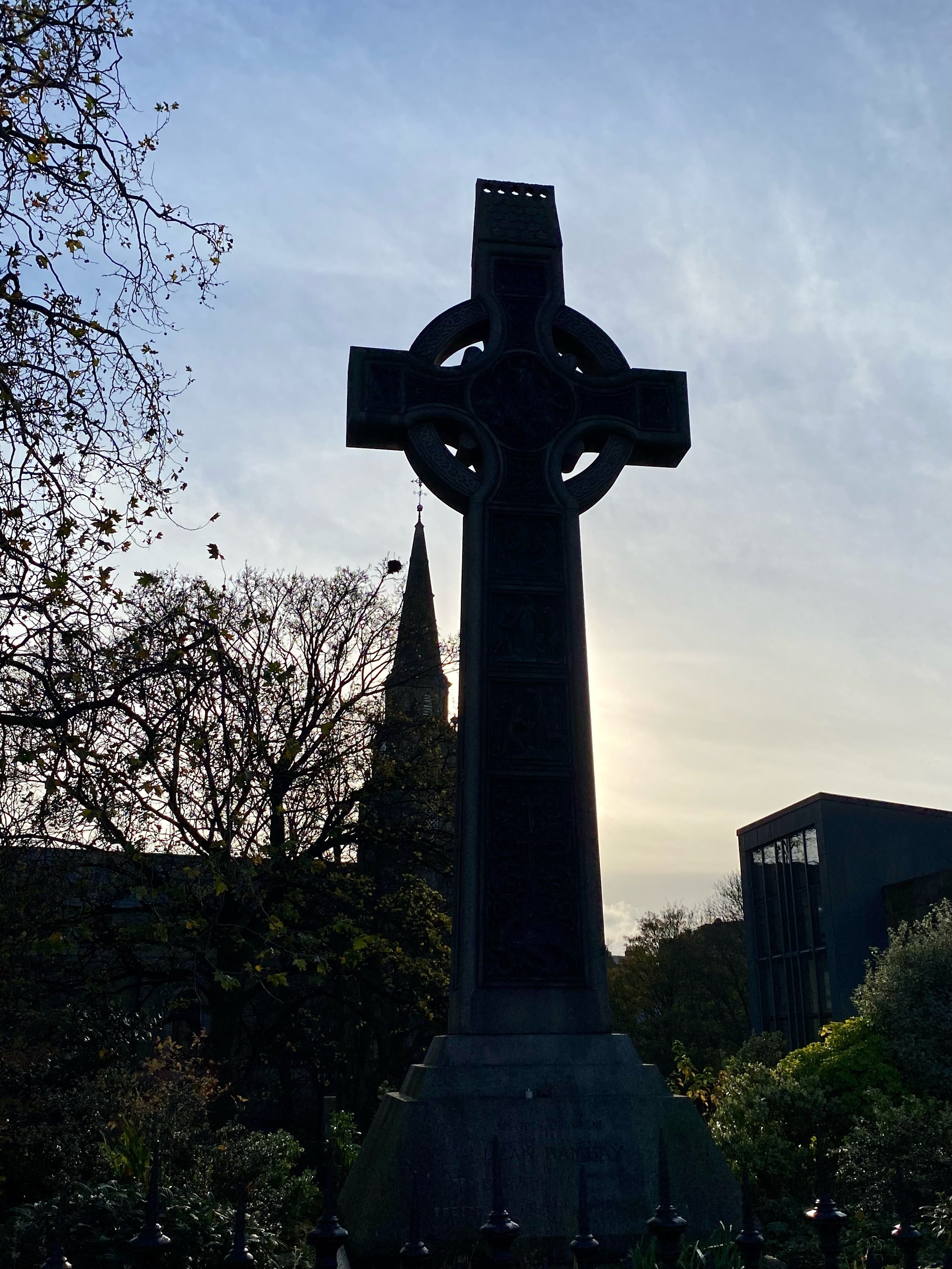




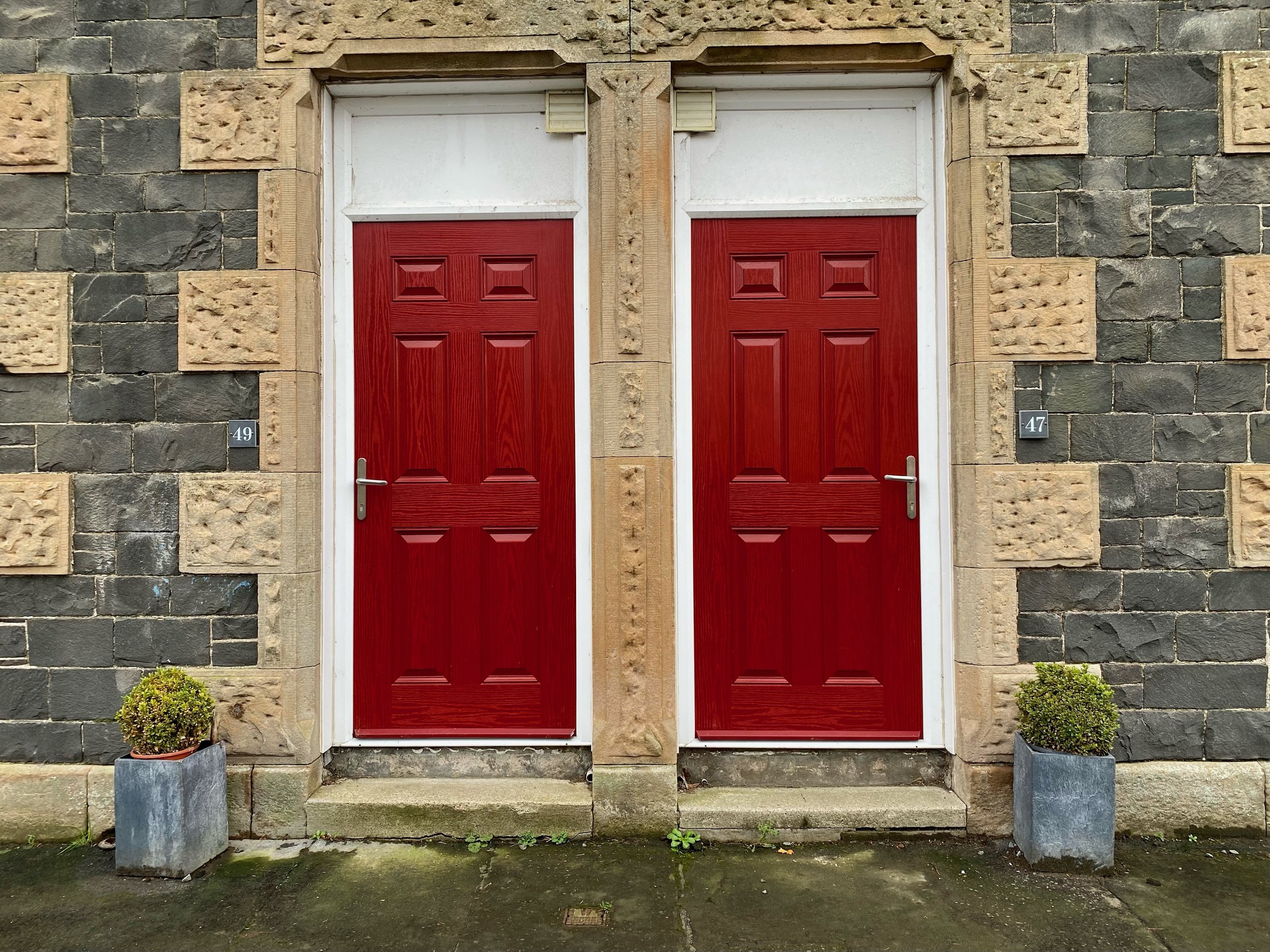
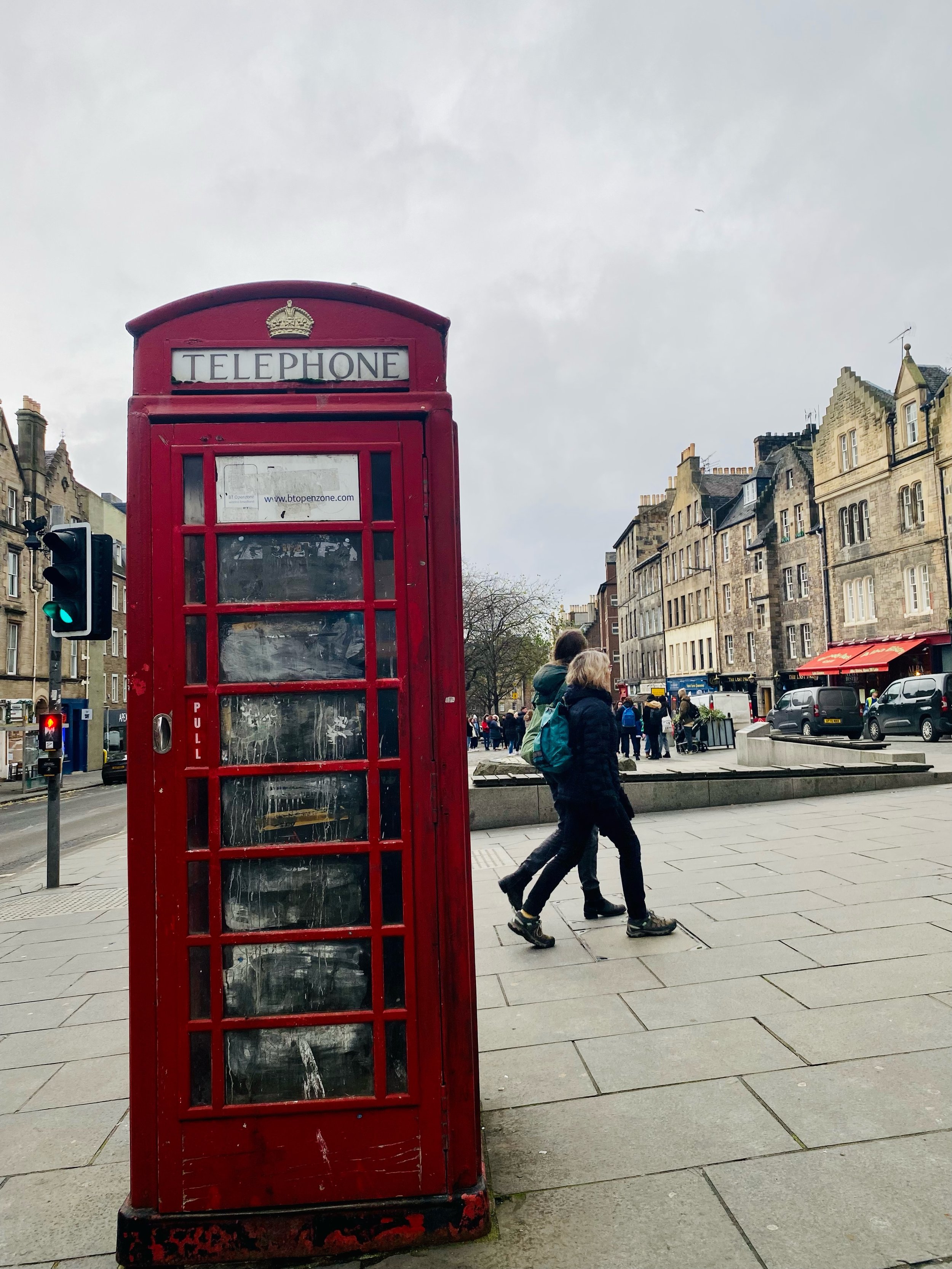





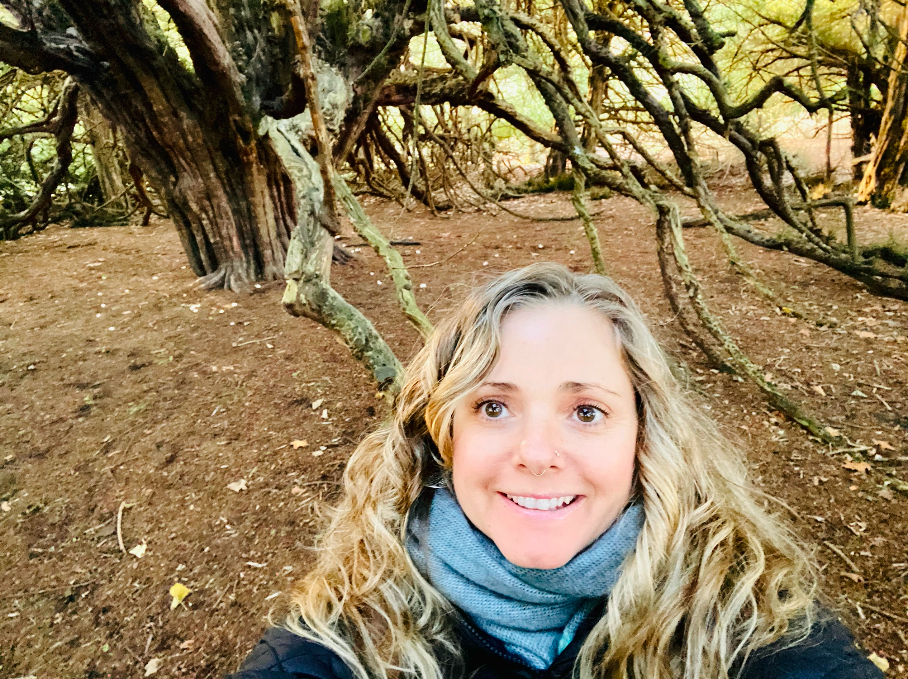













Scotland was filled with indescribable magic. The land was lively and vibrant; the people had a lightness in their eyes. I could feel relief, the weight of 12 years slowly pulling away, allowing room for spaciousness. I felt like a kid in a candy store, eyes wide with amazement and joy at the sights, sounds, and smells of this new place. Fulfillment, bliss, and comfort began to fill my heart and soul. A felt-sense of peace rooted into my body.
This was rest. This was a reset for my entire system.
It's a challenge for Americans to rest. We are bred to work hard, taking time off work is a big deal for us. Over there, five weeks of paid time off for a holiday is not only given but expected. The idea of working nonstop, with little to no time off is completely unheard of… no wonder they seem happier than Americans.
Taking this time to nourish my spirit by slowing down, filling my cup with sacred sites, local music, amazing friends, and exploration - returning, I feel lighter, happier, and I have more to give. I want to tell everyone that if you feel your soul calling for rest, give your soul rest. If you feel your heart yearning for connection, nature, friends, and exploration; seek out those joys
The cyclic sadness is gone.
I have indeed rewritten
my story and you can too, even if it’s just a rest on the acupuncture table.
Women's Cycle Within Yin and Yang (Pt. 3)
In this third installment of our Women’s Cycle Within Yin and Yang, we are diving into the follicular phase. The body is still in a Yin state. Follicles are developing as the body prepares to receive an embryo in the following stage. This blog post will additionally explain how acupuncture and TCM can help with the following issues: PCOS, Endometriosis, Low Ovarian Reserve, low levels of Anti-Müllerian hormone, and infertility.
~ The Follicular Phase ~
Artwork by @enorasis_art_prints on Instagram
In Chinese medicine, the menstrual cycle is broken into two halves and four phases. The two halves are the Yin phase and the Yang phase. The four phases are menstrual, post-menstrual (follicular), ovulation, and pre-menstrual or implantation (luteal).
This blog post is the third in our latest series:
“Women’s Cycle Within Yin and Yang”
if you missed the two previous posts of this series you can catch up here:
https://www.krystalkinnunen.com/bloghome/yinyang
https://www.krystalkinnunen.com/bloghome/2021/10/23/womens-cycle-within-yin-and-yang-pt-2
Developing Follicles and Maintaining Yin
The Follicular Phase, the second phase of the Menstrual Cycle, is the transitional point between menstruation and ovulation. It is when the follicles are growing, the hormone estrogen is being produced and the endometrial lining is thickening, preparing to receive an embryo in the following (luteal) phase of the cycle.
When a woman reaches the Follicular Phase, they are relatively Qi and blood deficient, as they have just finished the Menstrual Phase. At this point in the cycle, blood continues to rebuild along with Yin essence and Qi. As this point of the cycle nears the end, clear, stretchy cervical mucus is produced - followed by ovulation.
The Three Most Important Things During the Follicular Stage
Support Follicle Development
Nourish Blood
Nourish Yin Hormones
Just like the first phase, the Menstrual Phase of the cycle, the body remains in a Yin state. Yin is cooling, nourishing, and moistening. Yin essence works to moisten and nourish the organs and tissues in the body, which is especially important during this phase. In the uterus, nourishment is important for conception and for the development of follicles. Yin is restful, calm, and relaxed energy. Yin is damaged by stress, overworking, lack of sleep, and all things ‘rushed’. Therefore, it is important to remember to slow down. This phase will be the last of Yin energy in our Menstrual Cycle and builds up to the next Yang phase. The follicular phase reminds us to allow time for rest and regeneration - allowing the rebuilding of blood and yin. Remember my loves, we want to nourish and replenish our bodies so that we can nourish the follicles for ovulation. Take care of yourself, do things that bring you joy, and enjoy this period of slow, gentle rest.
Disorders and Imbalances that Acupuncture Can Help
There are many disorders associated with the Follicular Phase and the next phase (ovulation). A few of those disorders and imbalances include PCOS, Endometriosis, Low Ovarian Reserve, low levels of Anti-Müllerian hormone, and infertility. At Asheville Integrative Acupuncture, we specialize in women’s health, infertility, and pregnancy. Studies have shown that regular acupuncture, implementing Chinese herbs, and other TCM remedies can drastically increase the chances of fertility and pregnancy.
A 2010 review for Gynecological Endocrinology stated that “Acupuncture therapy may have a role in PCOS by: increasing of blood flow to the ovaries, reducing of ovarian volume and the number of ovarian cysts, controlling hyperglycaemia through increasing insulin sensitivity and decreasing blood glucose and insulin levels, reducing cortisol levels and assisting in weight loss and anorexia.” Many recent studies have been produced stating that acupuncture significantly reduces pain associated with endometriosis, reduces the size of pelvic masses, and reduces CA-125 levels in the body. One study, completed at Tongji University Hospital found that acupuncture reduced pain levels more significantly than drug therapy medication. The difference was 92.0% total effective rate (acupuncture) to 52.0% total effective rate (drug therapy with mifepristone).
At Asheville Integrative Acupuncture, I offer support for a range of issues at my fertility clinic, including: Advanced Maternal Age (AMA), Anovulation / Ovulatory Disorders, Diminished Ovarian Reserve (DOR), Endometriosis, Immunologic Factors, Hormonal Imbalances / Ovulatory Disorders, Luteal Phase Defect, Male Factor, Polycystic Ovarian Syndrome, Tubal Obstruction, Unexplained Infertility, Uterine Lining Problem, Low Sperm Count, Low Motility, Poor Morphology, Poor Liquefaction, Antisperm Antibodies, and support during fertility optimization processes.
Infographic by @kanpobliss on Instagram
Infographic by @kanpobliss on Instagram







